牛津英语七年级下册复习资料
牛津沪教版英语七年级下期末重点知识复习总结
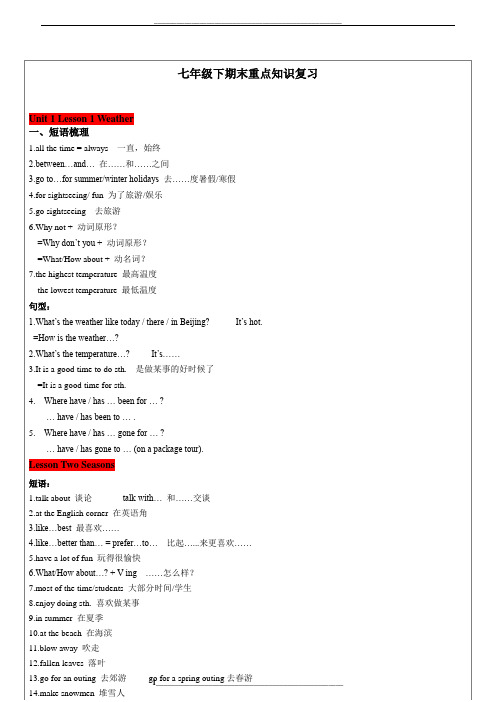
a(one) quarter或one-fourth四分之一three quarters或three-fourths四分之三回答型阅读解题技巧一、专题知识梳理知识点1:回答问题的题型、考点和分值1. 题型:一般疑问句,选择疑问句,反义疑问句,特殊疑问句,主观题2. 考点:对各种疑问句的回答方式及语法的考查(如:时态,主谓一致等)1)一般疑问句的回答:yes or no来回答2)选择疑问句的回答:选择其中的一个或者neither或者both来回答3)反义疑问句的回答:根据事实来回答4)特殊疑问句的回答:why—because/because of, how—by/through doing, how long—for+时间段/since+时间点, when和where提问,介词不能够少,how many或者how far提问时,注意限定词only/more than/ at least/about等5)主观题,注意不能用I think it is interesting或者I think it is good来回答,一定要发表自己的观点和原因。
3. 分值:共12分知识点2:回答问题的技巧1.细节题细节题目比较简单,一般从文中可以直接找到答案,直接抄下来就可以2.归纳总结归纳总结类的题目相对较难,基础好的学生还可以,基础较薄弱的学生一般会抄原文或者自己总结的,但是会出现各种各样的错误二、专题精讲D. Answer the question. (根据短文内容,回答下面问题,12分)It's March, 2050.Frank and Mary Smith wake up in their comfortable house in the morning and switch on the bedroom computer to get the latest news. They used to read the Times, but changed to electronic newspapers many years ago.There is the usual news about space: another space flight has returned from Mars and scientistshave discovered a new planet. Then they turn to business news: the US dollar has risen greatly inShanghai, one of the world's leading business centers. Mary tells the computer to buy 5,000 dollars, andthere is a quick response that it has been done.As they watch the screen, Mary orders one of the household robots to make coffee for them.Frank disappears into the study to join a video conference with his partners aroundthe world. He is a computer engineer, working for several companies. This is histhird job: he used to be in marketing and then television.Mary has a quick look at the shopping channels - the usual selection of electric cars, household robots and cheap travel offers - before picking up the video phone to talk to her assistant. She also hasa job and she is doing medical research. Both she and Frank used to have an office desk in London, butin 2014 they decided to move to the seaside and work from home.Frank and Mary have one daughter, Louise, who also has her own workstation at home. She goes to school only one day a week, mainly to play with other students. Classrooms disappeared in 2030 because there was no longer any need for them: communications systems have made it much easier to learn at home.Louise, now thirteen, is studying Chinese at present, which has become a world language as important as English. Louise has many Chinese friends. They communicate by computer.According to the family doctor, Louise will live to at least 130. Her wish is to work for a few decades (十年) and then spend her time on music and painting.细节题:4.Who proved that Sir Francis Bacon was right?_______________________________________________________.5.What do you think of Sir Francis Bacon?______________________________________________________________.(2)Library Rules for TeenagersWe want you to remember these rules for our city libraries.◆Always remember to take your library card with you when you visit the library. If you don’thave your library card, we won’t let you in.◆Your library card is for your use only. If you lend it to others, you will still be responsiblefor (对……负责任) the books on the card.◆If you lose your library card, you can get a new one for free with your ID card.◆Take good care of what you borrow. If you lose it, you will have to pay for it.◆You can keep the books for up to 31 days. Remember to return the books on time.◆Tell us your e-mail address and we will remind (提醒) you when you need to return the books.◆If what you want to borrow has been borrowed by others, you can send us an e-mail. We will keep the book for youwhen it is returned. When it is your turn, we will tell you.Read and answer the following questions(阅读短文并回答问题):80. Who are these rules for?_______________________________________81. Can we lend our own library card to others for use?_______________________________________82. What can you do if you lose your library card?_______________________________________83. What will happen if you borrow a book from the library and lose it?_______________________________________84. How long can you keep a book?_______________________________________85. Why does the library need readers’ e-mail address?_______________________________________。
牛津上海版七年级英语下册知识点
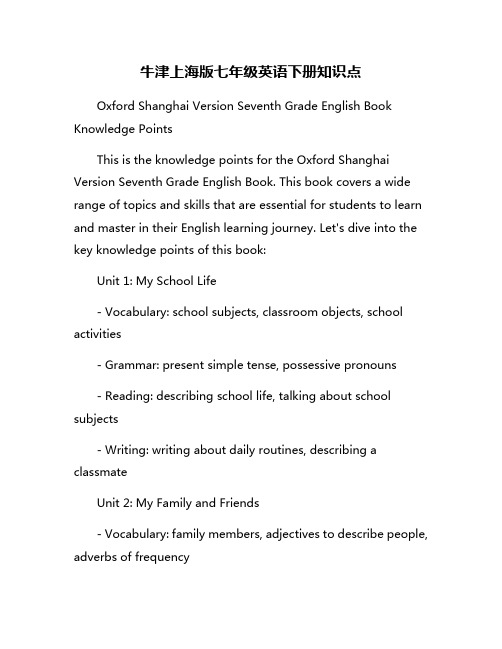
牛津上海版七年级英语下册知识点Oxford Shanghai Version Seventh Grade English Book Knowledge PointsThis is the knowledge points for the Oxford Shanghai Version Seventh Grade English Book. This book covers a wide range of topics and skills that are essential for students to learn and master in their English learning journey. Let's dive into the key knowledge points of this book:Unit 1: My School Life- Vocabulary: school subjects, classroom objects, school activities- Grammar: present simple tense, possessive pronouns- Reading: describing school life, talking about school subjects- Writing: writing about daily routines, describing a classmateUnit 2: My Family and Friends- Vocabulary: family members, adjectives to describe people, adverbs of frequency- Grammar: simple present tense, prepositions of place- Reading: introducing family and friends, talking about likes and dislikes- Writing: writing a short paragraph about family members, describing a friendUnit 3: My Free Time- Vocabulary: hobbies and leisure activities, sports and games, time expressions- Grammar: present continuous tense, future forms- Reading: talking about free time activities, discussing plans for the weekend- Writing: writing a short text about weekend plans, describing a favorite hobbyUnit 4: My Daily Routine- Vocabulary: daily activities, time expressions, food and drinks- Grammar: present continuous tense, imperatives- Reading: describing daily routines, talking about meal times- Writing: writing a short paragraph about daily routines, describing a mealUnit 5: My Home Town- Vocabulary: places in town, directions, landmarks- Grammar: there is/there are, past simple tense- Reading: describing a home town, giving directions- Writing: writing a short text about favorite places in town, giving directions to a landmarkUnit 6: My Travels- Vocabulary: modes of transport, holiday destinations, travel experiences- Grammar: present perfect tense, past continuous tense- Reading: talking about travel experiences, discussing favorite holiday destinations- Writing: writing a travel diary entry, describing a memorable journeyIn addition to these key knowledge points, the book also includes language skills practice activities, listening exercises, and speaking tasks to help students improve their English skillsin all areas. By mastering the knowledge points in this book, students will be well-equipped to communicate effectively in English and expand their language abilities.Overall, the Oxford Shanghai Version Seventh Grade English Book offers a comprehensive guide to learning English at a beginner level, covering essential topics and skills that will help students build a strong foundation in the language. With engaging activities and clear explanations, this book is a valuable resource for students looking to improve their English proficiency.。
牛津版七年级英语下册期末复习资料(全)
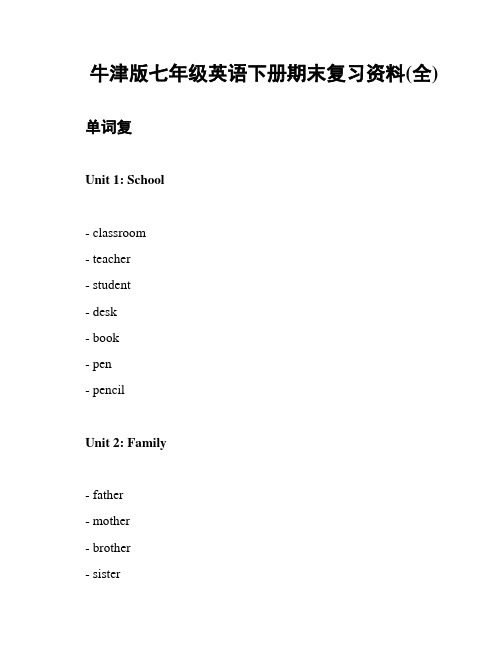
牛津版七年级英语下册期末复习资料(全)单词复Unit 1: School- classroom- teacher- student- desk- book- pen- pencilUnit 2: Family- father- mother- brother- sister- grandpa- grandma- familyUnit 3: Sports- basketball- football- swimming- tennis- running- baseball- volleyballUnit 4: Hobbies- listen to music - read books- watch movies- play video games- dance- draw- sing句子练1. What's your favorite subject?2. My favorite subject is English.3. How many brothers do you have?4. I have two brothers.5. Does she like playing basketball?6. Yes, she loves playing basketball.7. When do you usually do your homework?8. I usually do my homework in the evening.9. What are you doing?10. I'm listening to music.文法复现在进行时- 表示正在进行的动作或事情- 结构:主语 + am/is/are + 动词的ing形式例句:I am studying for the English test.一般现在时- 表示经常或惯性发生的动作- 结构:主语 + 动词原形 (+ 其他)例句:They play basketball every day.一般过去时- 表示过去发生的动作或状态- 结构:主语 + 动词的过去式 (+ 其他)例句:He watched a movie last night.阅读理解Read the following passage and answer the questions below:My name is Lucy. I am twelve years old. I live in London with my parents and younger sister, Lily. I love playing tennis and I practice every day after school. My favorite subject is science because it's interesting. I also enjoy reading books in my free time. Last weekend, my family and I went to the beach. We had a great time swimming and building sandcastles.1. How old is Lucy?2. Where does Lucy live?3. What is Lucy's favorite subject?写作训练Write a paragraph (50-100 words) about your last summer vacation.参考答案- 阅读理解:1. Lucy is twelve years old.2. Lucy lives in London.3. Lucy's favorite subject is science.。
牛津英语七年级下知识点

1.语法知识点:-一般现在时:主语+动词原形-一般过去时:主语+动词过去式- 现在进行时:主语+be动词+动词-ing形式- 一般将来时:主语+will+动词原形- 情态动词can、must、may等的用法-疑问句的组成:疑问词+一般疑问句/否定疑问句/选择疑问句-祈使句的用法:动词原形+其他- 被动语态:be动词(各种时态)+过去分词- there be句型:there be+物/人(不论单复数),表示地有物/人-名词所有格与物主代词的用法-副词的用法:一般在动词或形容词之后修饰它们- 连词的用法:and、but、so、because等的使用-定冠词与不定冠词的用法-数词的用法:基数词与序数词的使用2.词汇知识点:七年级下册词汇主要涵盖以下几个主题:-单词分类:人,动物,自然,城市,交通工具,菜肴,学科,职业等-数字、颜色、天气、季节等基本词汇-日常生活词汇:家庭、日常活动、购物、饮食、运动等-学校及学习用品词汇-描述性词汇:人物特征,衣服,感受等-游戏、音乐、戏剧等娱乐活动相关词汇-旅游、度假及参观相关词汇-时间与日期词汇3.对话与口语表达能力:七年级下册的对话主要涵盖日常生活、学校、购物、运动、假期、饮食等方面的交际场景。
学生需要学会简单的自我介绍、问候、表达个人爱好及偏好、提问、回答等基本口语表达方式。
同时,也需要学会根据所学语法知识构造简单的对话,实现对话的连贯性与合理性。
4.阅读理解与写作:七年级下册的阅读理解主要包括对短文的理解、回答问题、判断正误、填空等题型。
题材主题多样化,如校园生活,外出旅游,各种活动等。
学生需要通过阅读理解提升自己的阅读能力,扩大词汇量,提高对句子结构和上下文的理解能力。
同时,写作部分要求学生能够根据给出的题目和提示,用正确的语法和词汇结构写一篇不少于80词的短文。
以上是牛津英语七年级下册的主要知识点,通过对这些知识点的系统学习和灵活运用,学生能够基本掌握英语的基础知识,提高对英语的理解和运用能力。
七年级下牛津版知识点
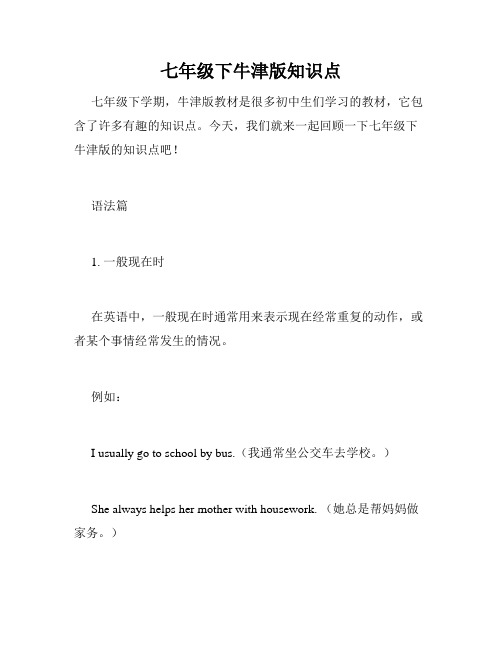
七年级下牛津版知识点七年级下学期,牛津版教材是很多初中生们学习的教材,它包含了许多有趣的知识点。
今天,我们就来一起回顾一下七年级下牛津版的知识点吧!语法篇1. 一般现在时在英语中,一般现在时通常用来表示现在经常重复的动作,或者某个事情经常发生的情况。
例如:I usually go to school by bus.(我通常坐公交车去学校。
)She always helps her mother with housework. (她总是帮妈妈做家务。
)2. 简单过去式简单过去式一般用于描述过去发生的一件事情,比如我们讲述自己的经历时,就会用到简单过去式。
通常我们会在动词原形后加上“-ed”形式的过去式。
例如:He visited the museum yesterday. (他昨天参观了博物馆。
)I watched TV last night. (昨晚我看了电视。
)3. 一般将来时一般将来时用于描述将来某个时间会发生的事情,通常我们会在动词原形前加上助动词“will”。
例如:I will go to the beach with my family next weekend.(下个周末我会和家人去海边。
)We will have a party next month to celebrate his birthday.(下个月我们会开派对庆祝他的生日。
)词汇篇1. 学科名词学科名词是指与各门学科相关的专业词汇,这些词汇通常用于描述学科的内容和特点。
例如:mathematics(数学)、physics(物理)、biology(生物)、chemistry(化学)、history(历史)、geography(地理)等。
2. 颜色词汇颜色词汇指的是用来描述物体颜色的词汇。
例如:red(红色)、blue(蓝色)、green(绿色)、yellow(黄色)、orange(橙色)、purple(紫色)等。
3. 运动名词运动名词是指各种体育运动的名称,这些词汇通常用来描述各种运动比赛的场景和规则。
(完整word版)牛津英语七年级下册复习资料

Unit 1 一、短语1. plan to do 计划做某事2. go skiing 去滑雪3. these days 如今4. be famous for 因…而著名5. be famous as 作为…而出名6. be similar to 与…相似7. look down on…俯视,鸟瞰8. take part in 参加9. with a difference 与众不同的10. all / different kinds of 各种各样的11. a warm welcome 热烈欢迎12. at first 起初13. give a talk 演讲14. according to 根据,按照15. on one’s way (to) 在…的路上16. interesting places 名胜17. on time18. far away from…远离……19. get through 穿过20. next to 在…旁边21. in fact 事实上22. keep out invaders 阻止侵略者23. sail away 驶走;漂走24. millions of 很多,上百万的25. hope to do 希望做某事26. one day 有一天27. in the future 在未来28. tell sb. about sth. 告诉某人某事29. have a wonderful time 过得愉快30. enjoy oneself 31. go abroad 出国31. go abroad 出国32. fruit and vegetables 蔬果33. go sightseeing 观光34. go /be on holiday 渡假35. from place to place 到处36. call sb. on the phone 打电话给某人37. by the way 顺便说说38. the top of………的顶端39. sail down the river 顺流而下40. order food 点菜准时41. fall over 倒塌42. lean to 向……倾斜43. be closed to the public 不对公众开放二、词形转换care (v. / n.) - careful (adj.) - careless (adj.) - carefully (adv.)cross (v.) - across (prep.) crowd (v.) - crowded (adj.)center (n.) - central (adj.) France (n.) - French (n. / adj.)taste (v. / n.) - tasty (adj.) wonder (n.) - wonderful (adj.)design (v.) - designer (n.) different (adj.) - difference (n.)scenery (n.) - scenic (adj.) interest (v.) - interesting (adj.)meet (v.) - meeting (n.) amuse (v.) - amusing (adj.) - amusement (n.)三、语法1. what do you mean by (doing)…?2. and, but, so3.bring / show sb. sth. = bring / show sth.4. arrive & reach & get to5. voice & noise & sound6. so that 6. find 的用法7. spend & take …8. watch / see / hear sb. …do / doing9. (many) thanks for (doing) sth. 10. the number of & a number of11. with 表带有…12. 表达建议:why not…? / why don’t you…?/ what / how about doing…? / would13. such as & for example14. used to do & be used to doing15. until 5. one of + 复数名词+ 动词(单数)16. cross & across & through17. though & but18. it’s believed / shown (that)…19. work hard & hard work20. 动名词作主语& It’s + adj. + to doUnit 2一.短语1. protect the environment 保护环境提供某物给某人2. give out harmful gases 排放有害气体3. on Earth=on the earth 在地球上4. on earth 究竟5. come/be from 来自于6. one another/each other 互相;彼此7. collect some facts 收集信息8. living things 生物9. for example / such as 例如(上)10. be useful for…对……有用11. warn sb. (not)to do sth.告诫某人(不)做某事12. know a lot about 对……知道很多13. be in danger 处于危险之中14. be in trouble 处于困境之中;遇到麻烦15. be interested in …对……感兴趣16. communicate with sb. 与某人进行交流17. do the job (of)…起……作用18. pass sth to sb = pass sb sth 传递某物给19. cut down 砍掉;砍伐20. not…at all 根本不……21. a little 一点22. write an article 写文章23. be worried about…对……担心24. care about 关心;在乎25. make noise 吵闹;制造噪音26. give sb a hand= help sb 帮助某人27. feel about …对……有某种看法28. provide sth for sb= provide sb with sth= supply sb with sth =supply sth for/to sb)29. in the past 在过去30. the answer to the question 问题的答案31. do/try one’s best to do sth 尽力做某事32. start out small 从小事做起33. throw rubbish 扔垃圾34. thrwo …into/ onto…把……扔到……里35. both sides of………的双面36. belong to 属于37. make our environmen38. in the beginning 起初;刚开始的时候39. get /feel tired 感到疲惫40. stop…from doing sth. 阻止……做某事41. in one’s opinion 在某人看来42. in order of…以……的次序43. bring about 导致;引起某人44. blow away 吹走45. be caught in (a sandstorm) 遇上(沙尘暴)46. take measures 采取措施47. be washed away 被冲走48. make a difference 造成差别49. take care of 照顾50. run out of 用完51. even if 即使;纵然52. realize the importance of 认识到……的重要性二.词形转换use (v./n.) -useful (adj.) - useless (adj.)harm (v./n.) - harmful (adj.) - harmless (adj.) wonder (v./n.) - wonderful (adj.) noise (n.) - noisy (adj.) rain (v./n.) - rainy (adj.)health (n.) - healthy (adj.) condition (n.) - conditioner (n.) contain (v.) - container (n.) fight (v.) - fighter (n.)pollute (v.) - pollution (n.) communicate (v.) - communication (n.) worry (v. ) - worried (adj.) nature (n.) - natural (adj.)danger (n.) - dangerous (adj.) science (n.) - scientist (n.)choose (v.) - choice (n.) appear (v.) - disappear (v.)tire (v.) - tired (adj.) - tiring (adj.) important (adj.) - importance (n.)environ (v.) - environment (n.) chemistry (n.) - chemical (adj.)produce (v.) - product (n.)三.语法1. few, a few, little, a little 9. for example & such as2. join & take part in 10.without 的用法3. talk, say, speak, tell 11. warn 的用法4. voice, sound, noise 12. seem 的用法5. living & alive 13. make sb. do & make sb. / sth. + adj6. stop to do & stop (from) doing 14. or 在否定句中表并列7. -ed & -ing 15. 的用法现在进行时与一般现在时8. on over above 的区别16. 基本的反意疑问句Unit 3一、短语belong to属于because of因为reception desk接待处look for a job go 找一份工作book a room订一个房间go forward向前走allow sb. to do sth. 允许某人做某事on the left / right…在…左/右边lead sb. to …把某人带到…in the left-hand corner在左手(边)角落fire exit 消防通道next to在…的隔壁safety first安全第一welcome to欢迎来到…describe sth. to sb. 向某人描述…be able/unable to do不)能做某事bark loudly(狗)大声吠叫get the chance to do有机会做某事wake up睡醒hurt oneself弄伤自己smell smoke闻到烟味enjoy oneself过得愉快fire alarm火警be proud of…以…为荣wet some towels湿了些毛巾teach oneself =learn by oneself自学lie on the floor躺在地板上as fast as possible尽快seem like似乎像…help oneself to…随便吃些…fire engine消防车hear about 听说music to one’s ears悦耳的声音go past 经过show up 出现call for help 喊救命seconds later 一会儿、几秒后be on fire 起火,着火against the rule(s) 违反规定put out fire 灭火a sense of smell / sight嗅觉/视觉shout at 朝…大喊/ hearing / taste / touch听觉/味觉/触觉be close to 接近…keep one’s balance保持平衡look out of…朝…外面fall down跌倒be full of充满have a cold 感冒be seriously hurt伤得很严重construction worker建筑工人decide to do 决定做某事use…for doing / to do用…来做某事climb up the ladder 爬上梯communicate with sb. 与…沟通again and again 一次又一次地in fact事实上two more/another two 再多两个quite a few许多,相当多complain to…向…投诉/抱怨perfume maker香水制造商as well(句末)也be useful for对…有用all day整天二、词形转换receive (v.) - reception (n.) listen (n.) - listening (n.)explanation (n.) - explain (v.) build (v.) - building (n.)construct (v.) - construction (n.) most (adj.) - mostly (adv.)manage (v.) - manager (n.) loud (adj.) - loudly (adv.)safe (adj.) - save (v.) - safety (n.) serious (adj.) - seriously (adv.)sleep (v.) - asleep (adj.) able - unable (opp.)die (v.) - dead (adj.) ability - disability (opp.)use (v.) - useful (adj.) friendly - unfriendly (opp.)see (v.) - sight (n.) with - without (opp.)difference (n.) –different (adj.) fireman - firemen (复数)hear (v.) - hearing (n.)三、知识要点1. few, (quite) a few, little, (quite) a little 等2. both 的用法3. welcome 的用法4. 不规则动词的过去式(lead, leave, wet, smell, put, lie 等)5. seem 的用法6. stop to do & stop doing7. because & because of8. 人称代词& 反身代词9. taste / smell 等的用法10. two more & another two…11. the + adj. 表…一类人12. thank you for / use for doingUnit 4一.短语a packet of 一盒 a pot of 一壶in a way 在某种程度上shake one’s head 摇头change…into…=turn…into…把…..变成……be connected to 与……相连接look foolish 看起来很愚蠢in packets 用包装的形式flow through…通过……流动use sth to do sth 用……做……all kinds of 各种各样make electricity 制电a power station 发电厂figure out 弄清;算出for example 例如pay special attention to (doing) sth 特别注意electrical appliance/machine 电器deal with sth 处理某事glass/plastic container 玻璃/塑料容器in our daily life 在我们日常生活中pick sb. up 搭载人,带人走seem to do 看起来像做make our lives easier 使我们的生活更舒适 a series of 一系列;一套help sb (to) do sth=help sb with sth 帮助某人做某事in numbers 用数字difference between A and B A 和B 的不同之处make sth/sb adj 使某人/某物怎样make sb do sth 使某人做某事keep a diary 写日记leave…on 使…..处于工作/使用的状态by doing sth 以……方式free…from (doing) sth 使…..从……中解脱出来look through 通过……看;翻阅be careful of/with sth 对……小心put…away 将…收起;把…放回原处keep sth dry 保持某物干燥(keep sth/sb adj) answer the telephone 接电话a piece of advice(不可数) 一条建议lean out of 从……探出身turn on/ switch on 打开dress properly 着装得体turn off/ switch off 关掉around 11a.m. 早上11 点左右go out 熄灭urn up/ turn down (音量)调大声/小声(be) on the safe side 为了安全起见;以防万一more and more crowded 越来越拥挤make sure (that)确保on one way or another 以这样或那样的方式generally speaking 一般而言shopping mall 大型购物中心keep silent/ quiet 保持安静play the guitar 弹吉他play chess下棋at first 起初start a fire 引起火灾二.词形变化fool (v. 欺骗;n. 傻瓜) -foolish (adj )careful(adj.)---carefully(adv.)---care(v.) safe (adj.)—safely(adv.)explain (v.) –explanation (n.), servant (n.) ---serve (v.),contain (v.)---container(n.), produce(v.)---product(n.),different (adj.)--- difference (n.) battery---batteries,housewife---housewives, move(v.)---movement(n.)patient-impatient, unplug---plug,三.句型/语法1. Not a bad explanation.不错的解释7. 动名词的用法2. Can you get me …?你能给我买/拿……8. 情态动词:can, may, must3. It is hard to imagine…..很难想象……9. 分数的表达:基数+序数(one tenth 十4. like 的用法v.& prep. 分之一;two tenths 十分之二)5. with 的用法6. how soon, how long, how often, how farUnit 5一、短语find…interesting 觉得/发现……有趣find it adj to do sth 觉得/发现做某事怎样in our lives 在我们的生活中be interested in 对……感兴趣be on 上演;播放miles and miles 好几英里go to sleep = fall asleep 入睡;睡着go to bed 就寝all right 确实;好的be similar to…与……相似be different from 与……不同keep lively 保持活力(keep+adj)keep doing sth 一直/不停做某事hate doing sth 讨厌做某事hate being bored 讨厌烦闷take care of = look after 照顾live on…以……为生describe sth/sb as…把某物/某人描述成.keep…as pets 养……作宠物break the rules 破例;犯规run in rings 绕圈跑make sure 确保knock on/at the door 敲门get lost 迷路fall down 掉下来on one’s own=by oneself 独自;靠自己stone deaf 完全聋的的力量mind doing sth 介意做某事be pleased with…对……满意;喜欢at work 在工作46. be puzzled by…对……感到迷惑a dull moment 寂寞的一刻pay attention to (doing) sth 注意某事/做ten miles away 十英里远某事in a mess 肮脏;一团糟shout at sb.对某人大喊大叫pick out 挑出;辨别出talk with sb 与某人交谈blow away 吹走.in a friendly way 以友好的方式many a week=many weeks 数周be full of…充满/装满……an’t wait 迫不及待rush out 冲出去make sth for sb 为某人做某事waste time on (doing) sth 浪费时间在某lots of = a lot of 许多事上/做某事win a prize 赢得奖项 a crowd of 一群win first prize 获得一等奖have/take a shower 冲凉;沐浴go away 走开56. pick up 捡起keep back 别往前走in many ways 在许多方面right now = right away 马上;现在at the end of 在……的尽头二、词性变化、肯定并否定:interesting –uninteresting cheerful - cheerlessgenerous - ungenerous helpful- helplesspatient-impatient mess (n.) –messy (adj.)successful(adj)-success(n.)-succeed(v.) fun(n.)-funny(adj)freeze (v.)-frozen(adj.) poem(n.)-poet(n.)account(v.)-accountant(n.) calculate(v.)-calculator(n.)三、语法1. there will be 句型2. whole & all3. 代词one & it,ones & them4. who, who’s, whose5. find 的用法6. keep/finish/enjoy/practice/mind…+doing7. keep/be/become/get/turn…+adj.8. 名词性物主代词=形容词性物主代词+nUnit 6一、短语brush one’s teeth 刷牙be on 开着pour into 涌入;倒进happen to 发生look around 四处看drop…into…使……落入……里.flow down 流下fall to 下降到clean…up 把……洗干净refer to 提到;查阅pump…into…用泵把……抽到……keep warm (keep + adj)保持温暖in the first place 起初;一开始keep sth/sb adj 保持某物怎样remember not to dosth 记得不要做某事keep doing sth 继续/不断做某事shake one’s head 摇头help sb do sth 帮助某人做某事come out of 从……出来drive…crazy 让……抓狂rise from 从……升起on holiday 休假;度假carry…to…把……带到……tell story about…讲关于……故事water treatment works 水处理厂no problem 没问题sewage plant 污水处理工厂in charge of 负责;管理ground water 地下水ordinary people 普通人fresh water 淡水flow chart 流程图drinking water 饮用水bar chart 柱状图in fact 事实上fill up 装满;填满die of(thirst, hunger) 死于(口渴,饥饿) believe it or not 信不信由你in the end =at last= finally 最终at least 至少according to 根据take a shower 冲澡(淋浴)sound terrible 听起来很恐怖take a bath 洗澡(坐浴)be in a mess 一团糟leave sth doing 使……处于某种状态at the end(of)在…的末尾instead of (doing)代替(做)twice as much (as) 两倍(多) stop doing sth 停止做某事turn into…变成waste time doing sth 浪费时间做某事be made up of…由……什么组成/构成pick up 捡起from the start of…从……的开始二、词形变化:mix(v.) –mixture(n.) drink(v.)- drinkable(adj.)---undrinkablefreeze--- froze---frozen break—broke--- brokensalt(n.)---salty(adj.) thirst(n) –thirsty(adj)shine(v)---shiny (adj) possible(adj)---possibility(n)treat(v.)---treatment final(adj.) --- finally (adv)三、句型/语法1. It is adj for sb to do sth & it is adj of sb to do2. we need water for doing sth3. It says that +从句4. too…to/ so…that/ enough to do 7. 8.5. remember to do & remember doing until 的用法6. if 条件状语从句Unit 7一、短语in different ways 用不同的方式take off 脱掉(衣服等)(飞机)起飞;have a good/great time=enjoy oneself 玩do a survey 做调查得开心/愉快spend…on sth /( in) doing sth 花……在上/做某事come on 快点;赶快have trouble/difficulty (in) doing sth 做某事有困难plan to do sth 计划做某事learn about 了解,知道no wonder(+从句)难怪;怪不得eating habits 饮食习惯feel hungry and tired 感到又饿又累for example;such as 例如stop doing 停止做某事use sth to do sth= use sth for doing sth talk about 谈论用……做某事make sb do sth 使某人做某事be sure to do sth 一定/务必做某事find sth adj to do = find it adj to do sth 发现/觉得做某事怎样have been to 曾经去过某地at dinner 吃饭时have gone to 去了某地sit at the table 坐在桌子旁have been in 呆在某地get sth from…从……拿……a bit /a little + adj 有点怎样 a knife and fork 一副刀叉a bit of +n = a little + n 一点……cut off 切掉;切下thousands of 数千in the middle of 在……中间start /begin with 以……开始many different kinds of 很多不同种类的later in the meal 饭后be dying 就要死了at the beginning of 在……的开始some more 再要一些as soon as 一……就……different types/kinds of 不同种类的be saved 获救process sth into 把……加工成……according to 根据be good for 对……有益the majority of …大多数的…(not) far from 离……(不)远in recent years 近几年(与现在完成时连用) the same as 和……一样用)tea with sugar 加了糖的茶before/after + doing 做……前/后way of doing sth = way to do sth 做…的方式one more+n = another + n(单数)再(要)一个二词形变化serve(v.)-service(n.) host(n)-hostess(n.女) waiter(n.)-waitress(n.女)save(v)-safe (adj)-safety(n.) smell(n.)-smelly(adj.)(类似的有:tasty, shiny, salty, thirsty,etc) die (v.) - dying (adj.) servant (n.) -- serve (v.)true (adj.) -- truly (adv.) sleep (v.) –asleep (adj.)knife-knives三、句型/语法1. How do you feel about…= What do you think of …你觉得……怎样2. If, as soon as 时间状语从句,“主将从现”原则3. It’s adj of sb. 某人怎样4. 完成时的时间状语:already, yet, just, before, ever, never, since, for5. What’s the matter/touble (with you)? = What’s wrong with you? 你怎么了6. 用how long 提问for/since 的时间状语7. It’s time for sth ……的时间了It’s time to do sth 该做……了8. have been to, have gone to, have been in 的区别9. since 的用法。
牛津沪教版英语七年级下重点知识复习
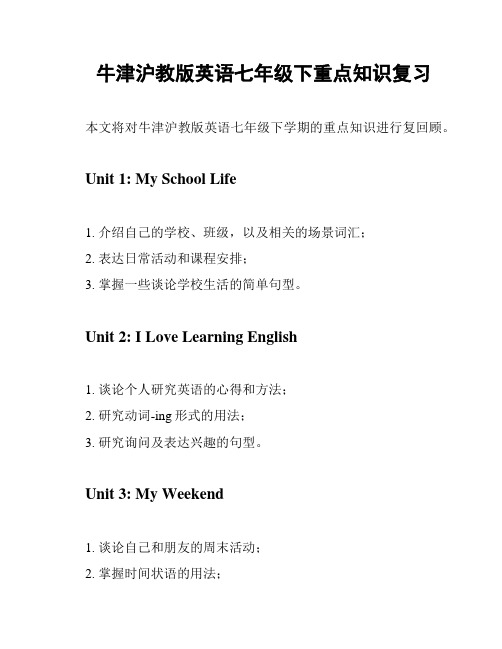
牛津沪教版英语七年级下重点知识复习
本文将对牛津沪教版英语七年级下学期的重点知识进行复回顾。
Unit 1: My School Life
1. 介绍自己的学校、班级,以及相关的场景词汇;
2. 表达日常活动和课程安排;
3. 掌握一些谈论学校生活的简单句型。
Unit 2: I Love Learning English
1. 谈论个人研究英语的心得和方法;
2. 研究动词-ing形式的用法;
3. 研究询问及表达兴趣的句型。
Unit 3: My Weekend
1. 谈论自己和朋友的周末活动;
2. 掌握时间状语的用法;
3. 掌握一些听力技巧。
Unit 4: Jobs
1. 研究表示职业的词汇;
2. 表达及询问个人志愿和理想。
Unit 5: Food and Drink
1. 研究食物和饮品的词汇;
2. 掌握询问及表述食物喜好和不喜好的方法。
Unit 6: Sports and Hobbies
1. 研究表示不同体育项目和爱好的单词;
2. 表达及询问个人感受和喜好。
Unit 7: Travelling
1. 谈论旅游的相关话题;
2. 表达和询问喜欢或不喜欢旅游的理由和偏好。
Unit 8: Festivals and Celebrations
1. 研究表示节日和庆祝活动的单词;
2. 谈论家庭或朋友间的庆祝活动。
总结
以上是牛津沪教版英语七年级下学期的重点知识复习,希望对大家的英语学习有所帮助。
七年级英语下册知识点牛津
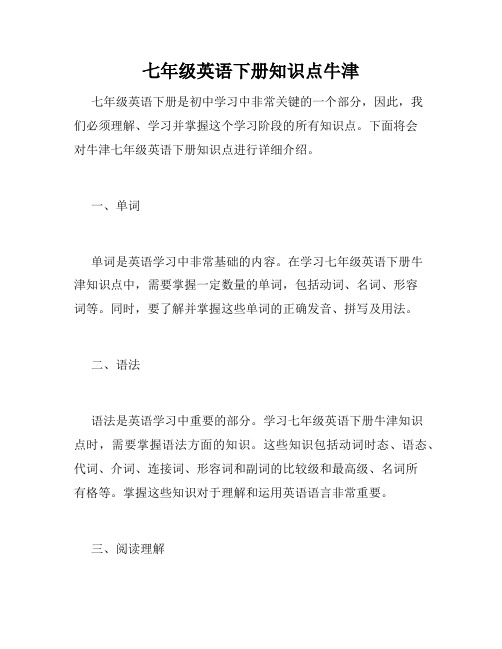
七年级英语下册知识点牛津七年级英语下册是初中学习中非常关键的一个部分,因此,我们必须理解、学习并掌握这个学习阶段的所有知识点。
下面将会对牛津七年级英语下册知识点进行详细介绍。
一、单词单词是英语学习中非常基础的内容。
在学习七年级英语下册牛津知识点中,需要掌握一定数量的单词,包括动词、名词、形容词等。
同时,要了解并掌握这些单词的正确发音、拼写及用法。
二、语法语法是英语学习中重要的部分。
学习七年级英语下册牛津知识点时,需要掌握语法方面的知识。
这些知识包括动词时态、语态、代词、介词、连接词、形容词和副词的比较级和最高级、名词所有格等。
掌握这些知识对于理解和运用英语语言非常重要。
三、阅读理解阅读理解是英语学习中非常重要的一部分。
在学习七年级英语下册牛津知识点时,需要掌握阅读理解方面的知识。
这些知识包括阅读技巧、文章结构、推理和归纳等。
通过阅读理解,我们可以更好地理解英语文章,并能够做出正确的理解。
四、听力口语听力口语是英语学习中必不可少的一部分。
在学习七年级英语下册牛津知识点时,需要掌握听力口语方面的知识。
这些知识包括听力词汇、听力技巧、口语发音、语音语调等。
同时,可以通过模仿课本中的录音内容进行口语训练,提高自己的口语表达能力。
五、文化背景学习七年级英语下册牛津知识点时,还需要了解一定的文化背景知识。
这些知识包括英语国家的历史、文化、地理等。
通过学习这些知识,我们可以更好地理解英语语言和文化,从而更好地学习和应用英语。
六、综合能力训练除了单纯的学习知识点外,还需要进行综合能力的训练。
包括写作、口语、阅读理解、听力等综合能力的提高,以便更好地应对日常生活和学习中的英语实际应用。
七、其他学习七年级英语下册牛津知识点时,还需要了解其他相关知识。
包括语言学习方法、课本中的语法规则等等。
通过系统性的学习,不仅能够更快地掌握英语知识,而且能够更好地运用英语,达到学以致用的目的。
以上就是七年级英语下册牛津知识点的详细介绍。
牛津上海版初一七年级下册英语知识点总结
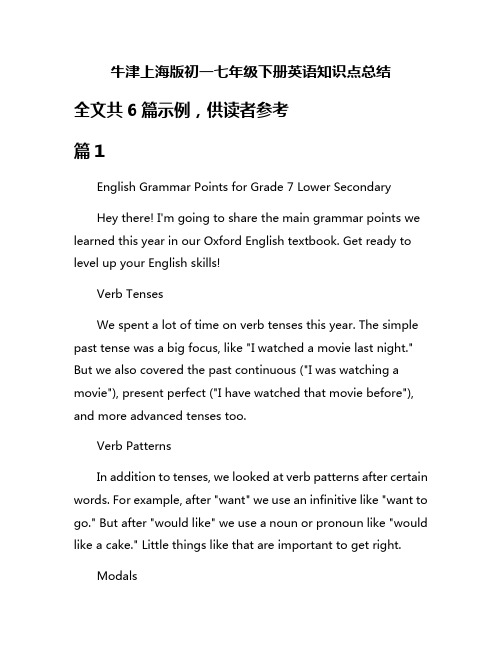
牛津上海版初一七年级下册英语知识点总结全文共6篇示例,供读者参考篇1English Grammar Points for Grade 7 Lower SecondaryHey there! I'm going to share the main grammar points we learned this year in our Oxford English textbook. Get ready to level up your English skills!Verb TensesWe spent a lot of time on verb tenses this year. The simple past tense was a big focus, like "I watched a movie last night." But we also covered the past continuous ("I was watching a movie"), present perfect ("I have watched that movie before"), and more advanced tenses too.Verb PatternsIn addition to tenses, we looked at verb patterns after certain words. For example, after "want" we use an infinitive like "want to go." But after "would like" we use a noun or pronoun like "would like a cake." Little things like that are important to get right.ModalsModal verbs were another grammar area, like "can, could, should, might, may" and so on. We practiced using them to express abilities, permissions, suggestions and more. For example: "You should study hard" or "I might go to the park later."ConditionalsIf clauses and conditional sentences were tricky but useful to express real and unreal situations. Like "If I won the lottery, I would buy a huge house" or "If it rains tomorrow, we will cancel the trip." Keeping the tenses correct was key.Passive VoiceTowards the end of the year, we started learning the passive voice, which switches the object to the subject position. For example: "The ball was kicked by John" instead of "John kicked the ball." Useful for lots of situations!Reported SpeechAnother late grammar topic was reported speech, for quoting what people said. It requires backshifting the tenses and using prompts like "he said..." For example: "He said he was feeling sick."Gerunds and InfinitivesKnowing when to use a gerund ("-ing" verb form acting as a noun) or an infinitive ("to" + verb) was an ongoing challenge. Like "I enjoy reading books" versus "I want to read a book." Tricky stuff!Vocabulary DevelopmentDaily Life & ActivitiesWe learned tons of everyday vocab for things like household items, personal routines, hobbies, school subjects, etc. Useful for discussing our lives!Food & HealthLots of food vocabulary, plus terms for illnesses, injuries, and healthy habits. All helping us describe physical wellness.Travel & TransportationWe built up a nice bank of words for traveling, like types of transportation, destinations, lodging, and cultural activities. For dreaming of adventures!Environment & NatureWith climate change being so important, we studied vocabulary related to the natural world, conservation efforts, pollution, and more.Technology & MediaIn our modern world, we had to cover plenty of tech terms too - from devices and apps to online activities and digital skills.A must these days!Personality & EmotionsDescribing character traits and feelings in English was key too. We got better at understanding and expressing the human experience through new vocab.Overall, this year's textbook really expanded our abilities to communicate effectively in English across many topics and situations. Between the grammar points and vocabulary areas, my English skills have grown a ton! Onward to more learning next year.篇2Title: Top Tips for Acing Grade 7 English Volume 2Hey there, fellow English learners! I'm here to share all the juicy details and top tips I've picked up from studying the Oxford Shanghai Edition Grade 7 Volume 2 English textbook. This book has been a total game-changer for leveling up my English skills,and I'm stoked to break it all down for you in a way that's easy to digest. Get ready to become an English master!Let's start with grammar, shall we? One of the key things we covered was tenses - from the simple present to the past perfect continuous. Keeping track of all those tenses can feel like a mind-bender at times, but once you get the hang of how and when to use them, it's a total breeze. My top tip? Practice, practice, practice with examples from the textbook until it becomes second nature.Next up, we've got modal verbs like "can," "should," and "must." These little guys might seem straightforward, but they can sometimes be tricky to use correctly. Pay close attention to the examples and explanations in the book - that's what really helped cement my understanding.Ah, and let's not forget about those pesky relative clauses! Whether it's defining or non-defining, subject or object, getting these right is crucial for clear, precise communication. The exercises in the book do an awesome job of walking you through different scenarios, so be sure to give them a solid go.Okay, okay, I know grammar can be a bit of a snooze-fest sometimes. But trust me, having a solid grasp of these fundamentals will make everything else we cover so much easierto master. It's like building a strong foundation for an epic English treehouse!Moving on to the fun stuff, we've got reading comprehension and vocabulary galore! The reading passages in this book are top-notch, covering all sorts of fascinating topics from different cultures and perspectives. As you're reading, be sure to jot down any unfamiliar words or phrases and look up their meanings. Building up that vocab bank is key for understanding what you're reading and expressing yourself clearly.And let's not forget about those delicious idioms and proverbs! Sprinkling those into your conversations is a surefire way to sound like a total English pro. The textbook has a ton of great examples and explanations to help you wrap your head around them.Writing is another major focus of this book, and let me tell you, the techniques and strategies they cover are absolute game-changers. From crafting a killer narrative to nailing that persuasive essay, you'll find all the tips and tricks you need to become a writing wizard.One thing that really stood out to me was the emphasis on the writing process - brainstorming, drafting, revising, andediting. It might seem like a lot of steps, but trust me, following this process will take your writing to the next level. Plus, the book provides plenty of examples and guided practice to help you get the hang of it.Okay, let's talk about something that used to make me want to pull my hair out: listening comprehension. Understanding those rapid-fire English conversations and lectures can be a real challenge, but fear not! The listening exercises in this book are designed to gradually build up your skills and confidence.My top tip? Don't get discouraged if you struggle at first. Pause, rewind, and listen again as many times as you need to. Slowly but surely, you'll start picking up on those key words and phrases, and your comprehension will skyrocket.Last but not least, we've got speaking skills. Whether it's engaging in casual conversations or delivering a formal presentation, this book has got you covered with tons of useful expressions, role-plays, and guided practice.One of the most valuable lessons I've learned is the importance of clear pronunciation and intonation. Nailing those can make such a huge difference in how well you're understood and how confident you sound. The pronunciation guides andexercises in the book are absolute lifesavers, so be sure to give them your full attention.Phew, we covered a lot of ground there, didn't we? But don't worry, I'm not done showering you with wisdom just yet. Here are a few final tips and tricks to help you make the most of this incredible textbook:Don't be afraid to make mistakes! Embrace them, learn from them, and keep pushing forward. That's the only way to truly improve.Practice, practice, practice! Whether it's grammar exercises, writing prompts, or speaking drills, the more you actively apply what you're learning, the better it will stick.Have fun with it! Learning English doesn't have to be a chore. Explore the cultural elements woven throughout the book, watch movies or shows in English, and find ways to make the language your own.Stay positive and believe in yourself! Mastering a new language is no easy feat, but you've got this. Celebrate your progress, no matter how small, and keep that motivation fire burning bright.Alright, my fellow English enthusiasts, that's a wrap! I hope this summary has given you a solid overview of what to expect from the Oxford Shanghai Edition Grade 7 Volume 2 English textbook and some killer tips to help you conquer it. Remember, with hard work, determination, and maybe a little bit of quirkiness thrown in, you've got this in the bag!Now go forth, study hard, and unleash your inner English rockstar!篇3Hey there fellow English learners! As we wrap up the 7th grade English textbook, I wanted to share a recap of all the major grammar points and vocabulary we covered this year. Mastering this stuff is gonna be super important as we head into 8th grade next year.First up, let's talk about tenses. We learned all about the different verb tenses this year - simple present, present continuous, simple past, past continuous, present perfect, etc. Being able to use these properly is key for speaking and writing clearly in English. The present tenses are for things happening now, the past tenses for stuff that already happened, and thefuture tenses for events still to come. Don't forget modal verbs too like "can", "should", "might" etc.Then there were all those pesky grammar rules we had to follow. Things like subject-verb agreement (like "he walks" not "he walk"), making nouns plural, using possessive forms ('s), comparatives and superlatives for adjectives...the list goes on! Remembering all the different rules can be a pain, but getting them right really smooths out your English.We also spent a bunch of time on question forms and question words like "what", "where", "why" etc. Asking good questions is an important skill. Oh and I can't forget about negative statements - adding "not" or using contractions like "doesn't" and "can't". Being able to negate things properly is crucial.On the vocabulary side, we learned soooo many new words divided up into different topics and contexts. Animals, occupations, hobbies, school life, describing people and personalities, you name it! Building up that word power makes it much easier to understand what you're reading and to express yourself clearly.We had units on things like daily routines, free time activities, shopping, travel and tourism, traditions and customs around theworld. The dialogues and passages in the textbook really helped bring those vocabulary words to life and put them into realistic contexts.Then there were those slightly more academic topics we covered like environmental protection, social issues, scientific discoveries and technological innovations. Vocabulary related to those more scholarly subjects can be pretty advanced, but getting exposure to it now will pay off later.Phew, I'm getting a little winded just recapping all that we learned! But that's not all - we also worked a ton on our reading comprehension and writing skills over the course of the year. The reading passages always had lots of practice questions to test our understanding. And the writing tasks had us crafting all sorts of different text types like emails, stories, descriptions, persuasive essays and more.Oh and how could I forget about those grammar and vocabulary exercises? Page after page of fill-in-the-blanks, sentence rearranging, matching columns...you name it! Drilling those skills is maybe a little tedious, but that's how you really internalize that knowledge.Okay, I could probably go on, but I'll wrap it up there. Hopefully this refresher on all the key grammar, vocabulary,reading and writing points we covered gives you a nice summary to refer back to. We crammed a ton into this 7th grade book!Just being able to understand and produce all this stuff is already a huge achievement. But of course, the real test is being able to use it all naturally when speaking and listening too. That's a whole other challenge!Anyway, that's my two cents as we put a bow on 7th grade English. Why don't you let me know what you thought were the most important or most difficult parts? I'm sure everyone has different areas they struggled with. We're all in this together as English learners!篇4My English Adventure: Oxford Shanghai Edition - Grade 7 Volume 2Hi there! Are you ready to embark on an exciting English adventure with me? In this article, I'll be sharing some of the key knowledge points from the Oxford Shanghai Edition for Grade 7, Volume 2. Let's dive in!1. Vocabulary VoyageVocabulary is like a treasure trove of words that helps us express ourselves. In this book, we learn new words related to various topics such as family, school, hobbies, and more. It's important to practice these words regularly to become a master communicator!2. Grammar GalaxyGrammar is like the secret code that makes English make sense. In Grade 7, Volume 2, we explore different tenses, sentence structures, and parts of speech. Here are a few important grammar points to remember:Present Simple tense: We use it to talk about habits, routines, and general facts. For example, "I always brush my teeth before bed."Past Simple tense: We use it to talk about actions that happened in the past. For example, "Yesterday, I visited my grandparents."Comparative and Superlative adjectives: We use comparatives to compare two things and superlatives to compare more than two things. For example, "My dog is bigger than yours, but hers is the biggest."Prepositions: These are words like "in," "on," and "at" that show relationships between objects. For example, "The book is on the table."3. Reading RocketReading is like taking a rocket ship to explore new worlds and gain knowledge. Grade 7, Volume 2 introduces interesting stories, articles, and dialogues. Remember to read actively, understand the main idea, and look for important details. It's also helpful to keep a dictionary nearby to look up new words.4. Listening LaunchpadListening is an essential skill for understanding others and improving our own language abilities. The book provides listening exercises that help us recognize different accents, understand conversations, and follow instructions. Practice listening to English songs, watching English shows, and chatting with friends in English to boost your skills!5. Writing WonderlandWriting allows us to express our thoughts and ideas. In Grade 7, Volume 2, we focus on descriptive writing, narrative writing, and writing formal letters. Remember to plan your writing, use appropriate vocabulary and grammar, and proofreadfor mistakes. Let your imagination run wild and create amazing stories!6. Speaking SpaceSpeaking English helps us communicate with people from different cultures and backgrounds. Through dialogues,role-plays, and discussions, Grade 7, Volume 2 encourages us to speak confidently. Don't be shy! Practice speaking English with your classmates, friends, and even your family members.7. Exam ExplorerExams are like little quests that test our knowledge and skills. The book provides practice exercises and tips to prepare for exams. Manage your time wisely, review each unit, and ask your teacher for help if you're unsure about anything. Remember, every challenge is an opportunity to grow!That's it for our English adventure through the Oxford Shanghai Edition for Grade 7, Volume 2. Remember to have fun, stay curious, and never stop learning. English is a magical language that can take us on incredible journeys!Happy learning, and may your English skills soar to new heights!篇5English Summary for Grade 7 (Second Semester)Hey guys! Let me share with you the main things we learned in English class this semester. Our textbook was packed with cool stuff to help us speak better English.First up, we covered a ton of new vocabulary words across different units. From words related to health and fitness like "nutritious" and "stamina", to words about technology like "innovative" and "entrepreneur". Oh, and who could forget all those descriptive adjectives we picked up like "magnificent" and "breathtaking"? Using a wider range of vocabulary really leveled up our English expression.The grammar learning was also super helpful. We studied different tenses like the past perfect for talking about experiences before a certain point in the past. The passive voice was new too - that's for when the object of a sentence becomes the subject, like "The books were returned to the library." Using it made our sentences more formal and objective.Then there were things like conditional sentences with "if" clauses to discuss hypothetical situations. And don't forget the causative "have/get" structure for asking someone to dosomething, like "I had my brother clean the room." Slowly but surely, we're becoming grammar pros!Reading comprehension was a big focus as well. We read all sorts of passages - stories, articles, interviews, you name it. The key was learning strategies to understand the main ideas, make inferences based on details, and identify the author's purpose and tone. Annotating the texts by underlining and taking notes in the margins was really handy.For writing, we covered different text types like narratives, descriptions, expository essays and more. Having a clear structure with an introduction, body paragraphs and conclusion was crucial. We worked on developing our ideas with examples and elaboration. Using transition words and varying our sentences made the writing flow better too.Let's not forget about speaking and listening skills! We did a bunch of engaging activities like role plays, discussions, and audio exercises. Staying focused to catch key details was important for listening texts. For speaking, we focused on things like clarity, intonation, and using discourse markers like "Basically,...", "For instance,...".Project work was a highlight this term too! We got to work collaboratively in teams to create amazing presentations, skits,posters and more. It helped bring together all the different skills we were learning. Those final product showcases were always so awesome.Phew, that was a lot! I've got to give props to our textbook for packing in such a wide range of useful material to take our English abilities to new heights. Even though there was a ton to learn, the way it was taught made it feel easy and even fun at times. Can't wait to see what challenging stuff awaits us next year! For now, it's summer vacay time - yay!篇6Learning English: A Student's JourneyHey there, fellow students! As we embark on our journey through the fascinating world of English, let's take a moment to reflect on the incredible voyage we've embarked upon. The Oxford Shanghai Edition Grade 7 English textbook has been our trusty companion, guiding us through the intricate twists and turns of this beautiful language.First and foremost, let's talk about the building blocks of English: vocabulary. This textbook has introduced us to a wealth of new words, each with its unique meaning and purpose. From everyday expressions to subject-specific terminology, we'velearned how to weave these words together to create meaningful sentences and convey our thoughts effectively.But vocabulary alone is just the tip of the iceberg! We've also delved into the intricate world of grammar, exploring the rules that govern the way words are arranged and used. From tenses and subject-verb agreement to complex sentence structures, we've gained a deeper understanding of how to construct sentences that are not only grammatically correct but also logically coherent.Reading comprehension has been another vital aspect of our English journey. Through engaging texts and thought-provoking passages, we've honed our ability to analyze and interpret written material. We've learned to identify main ideas, make inferences, and draw connections between different pieces of information. This skill is invaluable, not only for academic success but also for navigating the world around us.Speaking and listening have also been at the forefront of our learning experience. We've practiced engaging in conversations, expressing our opinions, and actively listening to others. Through role-plays, discussions, and storytelling activities, we've gained confidence in our ability to communicate effectively inEnglish, a skill that will undoubtedly serve us well in our future endeavors.Writing, the art of expressing our thoughts on paper, has been another critical component of our studies. From crafting well-structured paragraphs to developing cohesive essays, we've explored various writing styles and genres. We've learned the importance of organization, clarity, and effective word choice, equipping us with the tools to convey our ideas in a compelling and persuasive manner.But our journey hasn't been solely focused on mastering the technical aspects of English. We've also explored the rich tapestry of cultures and traditions woven into the language. Through literature, art, and multimedia resources, we've gained insights into the diverse perspectives and experiences that shape the English-speaking world.Moreover, our textbook has emphasized the importance of critical thinking and analytical skills. We've learned to approach tasks and challenges with a discerning eye, questioning assumptions, and considering multiple viewpoints. This mindset will undoubtedly serve us well as we navigate the complexities of life and make informed decisions.As we near the end of our journey with this textbook, let's take a moment to appreciate the progress we've made. Each lesson, each activity, and each challenge has been a stepping stone towards becoming proficient and confident English speakers, writers, and thinkers.However, our journey doesn't end here. The knowledge and skills we've acquired are merely the foundation upon which we'll continue to build. As we move forward, let's embrace the endless opportunities that lie ahead, eager to expand our horizons and explore new frontiers of learning.Remember, the key to success lies in perseverance, curiosity, and a willingness to step outside our comfort zones. Let's continue to embrace challenges, seek out new experiences, and never stop learning. The world of English is vast andever-evolving, and with our newfound skills and knowledge, we are well-equipped to navigate its depths with confidence and grace.So, let's raise a metaphorical glass to our achievements and look forward to the exciting adventures that await us on our ongoing quest for knowledge and personal growth. The journey continues, and together, we'll conquer new heights, one word, one sentence, and one idea at a time.。
牛津沪教版英语七年级下期末重点知识复习总结
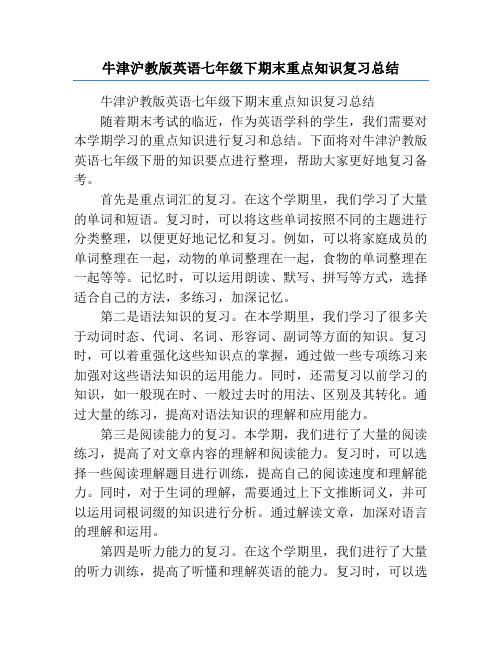
牛津沪教版英语七年级下期末重点知识复习总结牛津沪教版英语七年级下期末重点知识复习总结随着期末考试的临近,作为英语学科的学生,我们需要对本学期学习的重点知识进行复习和总结。
下面将对牛津沪教版英语七年级下册的知识要点进行整理,帮助大家更好地复习备考。
首先是重点词汇的复习。
在这个学期里,我们学习了大量的单词和短语。
复习时,可以将这些单词按照不同的主题进行分类整理,以便更好地记忆和复习。
例如,可以将家庭成员的单词整理在一起,动物的单词整理在一起,食物的单词整理在一起等等。
记忆时,可以运用朗读、默写、拼写等方式,选择适合自己的方法,多练习,加深记忆。
第二是语法知识的复习。
在本学期里,我们学习了很多关于动词时态、代词、名词、形容词、副词等方面的知识。
复习时,可以着重强化这些知识点的掌握,通过做一些专项练习来加强对这些语法知识的运用能力。
同时,还需复习以前学习的知识,如一般现在时、一般过去时的用法、区别及其转化。
通过大量的练习,提高对语法知识的理解和应用能力。
第三是阅读能力的复习。
本学期,我们进行了大量的阅读练习,提高了对文章内容的理解和阅读能力。
复习时,可以选择一些阅读理解题目进行训练,提高自己的阅读速度和理解能力。
同时,对于生词的理解,需要通过上下文推断词义,并可以运用词根词缀的知识进行分析。
通过解读文章,加深对语言的理解和运用。
第四是听力能力的复习。
在这个学期里,我们进行了大量的听力训练,提高了听懂和理解英语的能力。
复习时,可以选择一些较难的听力材料进行听写和理解练习,例如听对话选择答案、听短文填空等。
此外,还可以通过听英语原版的歌曲、电影、电视剧等,提高对真实语境下英语的听力能力。
最后是口语表达的复习。
英语学习的最终目标是能够流利地进行口语的沟通。
复习时,我们可以进行一些角色扮演的练习,模拟真实场景,例如购物、旅游、问路等,同时也可以与同学进行对话,提高自己的口语表达能力。
要注意注意纠正语音、语调和语速,使自己的口语更自然、流利。
牛津上海七年级英语下知识点复习汇总Unit 2 Going to see a film
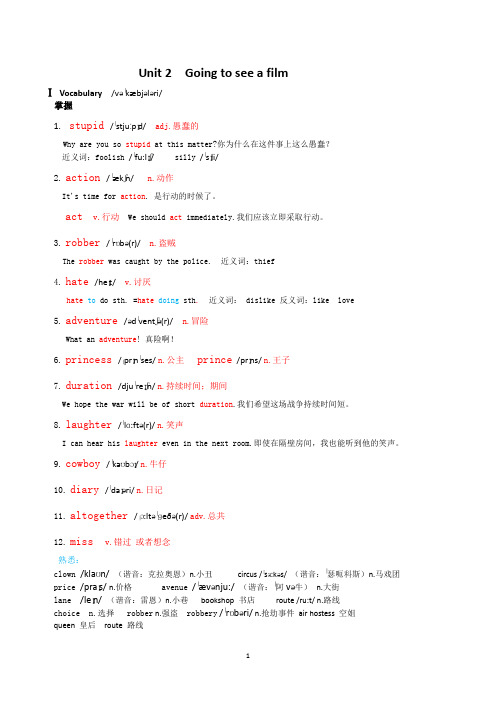
Unit 2 Going to see a filmⅠVocabulary/vəˈkæbjələri/掌握1. stupid /ˈstjuːpɪd/ adj.愚蠢的Why are you so stupid at this matter?你为什么在这件事上这么愚蠢?近义词:foolish /ˈfu:lɪʃ/ silly /ˈsɪli/2.action /ˈækʃn/ n.动作It's time for action. 是行动的时候了。
act v.行动We should act immediately.我们应该立即采取行动。
3.robber /ˈrɒbə(r)/ n.盗贼The robber was caught by the police. 近义词:thief4.hate /heɪt/ v.讨厌hate to do sth. =hate doing sth. 近义词: dislike 反义词:like love5.adventure /ədˈventʃə(r)/ n.冒险What an adventure! 真险啊!6.princess /ˌprɪnˈses/ n.公主prince/prɪns/ n.王子7.duration /djuˈreɪʃn/ n.持续时间;期间We hope the war will be of short duration.我们希望这场战争持续时间短。
ughter /ˈlɑ:ftə(r)/ n.笑声I can hear his laughter even in the next room.即使在隔壁房间,我也能听到他的笑声。
9.cowboy /ˈkaʊbɔɪ/ n.牛仔10.diary /ˈdaɪəri/ n.日记11.altogether /ˌɔ:ltəˈɡeðə(r)/ adv.总共12.miss v.错过或者想念熟悉:clown/klaʊn/ (谐音:克拉奥恩)n.小丑circus /ˈsɜ:kəs/ (谐音:ˈ瑟呃科斯)n.马戏团price /praɪs/ n.价格 avenue /ˈævənju:/ (谐音:ˈ阿və牛)n.大街lane /leɪn/ (谐音:雷恩)n.小巷bookshop 书店route /ru:t/ n.路线choice n.选择 robber n.强盗 robbery/ˈrɒbəri/ n.抢劫事件air hostess 空姐queen 皇后route 路线ⅡPhrase /freɪz/1.take a look=have a look 看一看let's take/have a look around the exhibition./ˌeksɪˈbɪʃn/ n.展览咱们看看展览吧。
(完整word版)牛津英语七年级下册复习资料

(完整word版)牛津英语七年级下册复习资料Unit 1 一、短语1. plan to do 计划做某事2. go skiing 去滑雪3. these days 如今4. be famous for 因…而著名5. be famous as 作为…而出名6. be similar to 与…相似7. look down on…俯视,鸟瞰8. take part in 参加9. with a difference 与众不同的10. all / different kinds of 各种各样的11. a warm welcome 热烈欢迎12. at first 起初13. give a talk 演讲14. according to 根据,按照15. on one’s way (to) 在…的路上16. interesting places 名胜17. on time18. far away from…远离……19. get through 穿过20. next to 在…旁边21. in fact 事实上22. keep out invaders 阻止侵略者23. sail away 驶走;漂走24. millions of 很多,上百万的25. hope to do 希望做某事26. one day 有一天27. in the future 在未来28. tell sb. about sth. 告诉某人某事29. have a wonderful time 过得愉快30. enjoy oneself 31. go abroad 出国31. go abroad 出国32. fruit and vegetables 蔬果33. go sightseeing 观光34. go /be on holiday 渡假35. from place to place 到处36. call sb. on the phone 打电话给某人37. by the way 顺便说说38. the top of………的顶端39. sail down the river 顺流而下40. order food 点菜准时41. fall over 倒塌42. lean to 向……倾斜43. be closed to the public 不对公众开放二、词形转换care (v. / n.) - careful (adj.) - careless (adj.) - carefully (adv.) cross (v.) - across (prep.) crowd (v.) - crowded (adj.)center (n.) - central (adj.) France (n.) - French (n. / adj.)taste (v. / n.) - tasty (adj.) wonder (n.) - wonderful (adj.)design (v.) - designer (n.) different (adj.) - difference (n.)scenery (n.) - scenic (adj.) interest (v.) - interesting (adj.)meet (v.) - meeting (n.) amuse (v.) - amusing (adj.) - amusement (n.)三、语法1. what do you mean by (doing)…?2. and, but, so3.bring / show sb. sth. = bring / show sth.4. arrive & reach & get to5. voice & noise & sound6. so that 6. find 的用法7. spend & take …8. watch / see / hear sb. …do / doing9. (many) thanks for (doing) sth. 10. the number of & a number of11. with 表带有…12. 表达建议:why not…? / why don’t you…?/ what / how about doing…? / would13. such as & for example14. used to do & be used to doing15. until 5. one of + 复数名词+ 动词(单数)16. cross & across & through17. though & but18. it’s believed / shown (that)…19. work hard & hard work20. 动名词作主语& It’s + adj. + to doUnit 2一.短语1. protect the environment 保护环境提供某物给某人2. give out harmful gases 排放有害气体3. on Earth=on the earth 在地球上4. on earth 究竟5. come/be from 来自于6. one another/each other 互相;彼此7. collect some facts 收集信息8. living things 生物9. for example / such as 例如(上)10. be useful for…对……有用11. warn sb. (not)to do sth.告诫某人(不)做某事12. know a lot about 对……知道很多13. be in danger 处于危险之中14. be in trouble 处于困境之中;遇到麻烦15. be interested in …对……感兴趣16. communicate with sb. 与某人进行交流17. do the job (of)…起……作用18. pass sth to sb = pass sb sth 传递某物给19. cut down 砍掉;砍伐20. not…at all 根本不……21. a little 一点22. write an article 写文章23. be worried about…对……担心24. care about 关心;在乎25. make noise 吵闹;制造噪音26. give sb a hand= help sb 帮助某人27. feel about …对……有某种看法28. provide sth for sb= provide sb with sth= supply sb with sth =supply sth for/to sb)29. in the past 在过去30. the answer to the question 问题的答案31. do/try one’s best to do sth 尽力做某事32. start out small 从小事做起33. throw rubbish 扔垃圾34. thrwo …into/ onto…把……扔到……里35. both sides of………的双面36. belong to 属于37. make our environmen38. in the beginning 起初;刚开始的时候39. get /feel tired 感到疲惫40. stop…from doing sth. 阻止……做某事41. in one’s opinion 在某人看来42. in order of…以……的次序43. bring about 导致;引起某人44. blow away 吹走45. be caught in (a sandstorm) 遇上(沙尘暴)46. take measures 采取措施47. be washed away 被冲走48. make a difference 造成差别49. take care of 照顾50. run out of 用完51. even if 即使;纵然52. realize the importance of 认识到……的重要性二.词形转换use (v./n.) -useful (adj.) - useless (adj.)harm (v./n.) - harmful (adj.) - harmless (adj.) wonder (v./n.) - wonderful (adj.) noise (n.) - noisy (adj.) rain (v./n.) - rainy (adj.) health (n.) - healthy (adj.) condition (n.) - conditioner (n.) contain (v.) - container (n.) fight (v.) - fighter (n.)pollute (v.) - pollution (n.) communicate (v.) - communication (n.) worry (v. ) - worried (adj.) nature (n.) - natural (adj.) danger (n.) - dangerous (adj.) science (n.) - scientist (n.)choose (v.) - choice (n.) appear (v.) - disappear (v.)tire (v.) - tired (adj.) - tiring (adj.) important (adj.) - importance (n.)environ (v.) - environment (n.) chemistry (n.) - chemical (adj.) produce (v.) - product (n.)三.语法1. few, a few, little, a little 9. for example & such as2. join & take part in 10.without 的用法3. talk, say, speak, tell 11. warn 的用法4. voice, sound, noise 12. seem 的用法5. living & alive 13. make sb. do & make sb. / sth. + adj6. stop to do & stop (from) doing 14. or 在否定句中表并列7. -ed & -ing 15. 的用法现在进行时与一般现在时8. on over above 的区别16. 基本的反意疑问句Unit 3一、短语belong to属于because of因为reception desk接待处look for a job go 找一份工作book a room订一个房间go forward向前走allow sb. to do sth. 允许某人做某事on the left / right…在…左/右边lead sb. to …把某人带到…in the left-hand corner在左手(边)角落fire exit 消防通道next to在…的隔壁safety first安全第一welcome to欢迎来到…describe sth. to sb. 向某人描述…be able/unable to do不)能做某事bark loudly(狗)大声吠叫get the chance to do有机会做某事wake up睡醒hurt oneself弄伤自己smell smoke闻到烟味enjoy oneself过得愉快fire alarm火警be proud of…以…为荣wet some towels湿了些毛巾teach oneself =learn by oneself 自学lie on the floor躺在地板上as fast as possible尽快seem like似乎像…help oneself to…随便吃些…fire engine消防车hear about 听说music to one’s ears悦耳的声音go past 经过show up 出现call for help 喊救命seconds later 一会儿、几秒后be on fire 起火,着火against the rule(s) 违反规定put out fire 灭火a sense of smell / sight嗅觉/视觉shout at 朝…大喊/ hearing / taste / touch听觉/味觉/触觉be close to 接近…keep one’s balance保持平衡look out of…朝…外面fall down跌倒be full of充满have a cold 感冒be seriously hurt伤得很严重construction worker建筑工人decide to do 决定做某事use…for doing / to do用…来做某事climb up the ladder 爬上梯communicate with sb. 与…沟通again and again 一次又一次地in fact事实上two more/another two 再多两个quite a few许多,相当多complain to…向…投诉/抱怨perfume maker香水制造商as well(句末)也be useful for对…有用all day整天二、词形转换receive (v.) - reception (n.) listen (n.) - listening (n.)explanation (n.) - explain (v.) build (v.) - building (n.)construct (v.) - construction (n.) most (adj.) - mostly (adv.)manage (v.) - manager (n.) loud (adj.) - loudly (adv.)safe (adj.) - save (v.) - safety (n.) serious (adj.) - seriously (adv.) sleep (v.) - asleep (adj.) able - unable (opp.)die (v.) - dead (adj.) ability - disability (opp.)use (v.) - useful (adj.) friendly - unfriendly (opp.)see (v.) - sight (n.) with - without (opp.)difference (n.) –different (adj.) fireman - firemen (复数)hear (v.) - hearing (n.)三、知识要点1. few, (quite) a few, little, (quite) a little 等2. both 的用法3. welcome 的用法4. 不规则动词的过去式(lead, leave, wet, smell, put, lie 等)5. seem 的用法6. stop to do & stop doing7. because & because of8. 人称代词& 反身代词9. taste / smell 等的用法10. two more & another two…11. the + adj. 表…一类人12. thank you for / use for doingUnit 4一.短语a packet of 一盒 a pot of 一壶in a way 在某种程度上shake one’s head 摇头change…into…=turn…into…把…..变成……be connected to 与……相连接look foolish 看起来很愚蠢in packets 用包装的形式flow through…通过……流动use sth to do sth 用……做……all kinds of 各种各样make electricity 制电a power station 发电厂figure out 弄清;算出for example 例如pay special attention to (doing) sth 特别注意electrical appliance/machine 电器deal with sth 处理某事glass/plastic container 玻璃/塑料容器in our daily life 在我们日常生活中pick sb. up 搭载人,带人走seem to do 看起来像做make our lives easier 使我们的生活更舒适 a series of 一系列;一套help sb (to) do sth=help sb with sth 帮助某人做某事in numbers 用数字difference between A and B A 和B 的不同之处make sth/sb adj 使某人/某物怎样make sb do sth 使某人做某事keep a diary 写日记leave…on 使…..处于工作/使用的状态by doing sth 以……方式free…from (doing) sth 使…..从……中解脱出来look through 通过……看;翻阅be careful of/with sth 对……小心put…away 将…收起;把…放回原处keep sth dry 保持某物干燥(keep sth/sb adj) answer the telephone 接电话a piece of advice(不可数) 一条建议lean out of 从……探出身turn on/ switch on 打开dress properly 着装得体turn off/ switch off 关掉around 11a.m. 早上11 点左右go out 熄灭urn up/ turn down (音量)调大声/小声(be) on the safe side 为了安全起见;以防万一more and more crowded 越来越拥挤make sure (that)确保on one way or another 以这样或那样的方式generally speaking 一般而言shopping mall 大型购物中心keep silent/ quiet 保持安静play the guitar 弹吉他play chess 下棋at first 起初start a fire 引起火灾二.词形变化fool (v. 欺骗;n. 傻瓜) -foolish (adj )careful(adj.)---carefully(adv.)---care(v.) safe (adj.)—safely(adv.)explain (v.) –explanation (n.), servant (n.) ---serve (v.),contain (v.)---container(n.), produce(v.)---product(n.),different (adj.)--- difference (n.) battery---batteries,housewife---housewives, move(v.)---movement(n.)patient-impatient, unplug---plug,三.句型/语法1. Not a bad explanation.不错的解释7. 动名词的用法2. Can you get me …?你能给我买/拿……8. 情态动词:can, may, must3. It is hard to imagine…..很难想象……9. 分数的表达:基数+序数(one tenth 十4. like 的用法v.& prep. 分之一;two tenths 十分之二)5. with 的用法6. how soon, how long, how often, how farUnit 5一、短语find…interesting 觉得/发现……有趣find it adj to do sth 觉得/发现做某事怎样in our lives 在我们的生活中be interested in 对……感兴趣be on 上演;播放miles and miles 好几英里go to sleep = fall asleep 入睡;睡着go to bed 就寝all right 确实;好的be similar to…与……相似be different from 与……不同keep lively 保持活力(keep+adj) keep doing sth 一直/不停做某事hate doing sth 讨厌做某事hate being bored 讨厌烦闷take care of = look after 照顾live on…以……为生describe sth/sb as…把某物/某人描述成.kee p…as pets 养……作宠物break the rules 破例;犯规run in rings 绕圈跑make sure 确保knock on/at the door 敲门get lost 迷路fall down 掉下来on one’s own=by oneself 独自;靠自己stone deaf 完全聋的的力量mind doing sth 介意做某事be pleased with…对……满意;喜欢at work 在工作46. be puzzled by…对……感到迷惑 a dull moment 寂寞的一刻pay attention to (doing) sth 注意某事/做ten miles away 十英里远某事in a mess 肮脏;一团糟shout at sb.对某人大喊大叫pick out 挑出;辨别出talk with sb 与某人交谈blow away 吹走.in a friendly way 以友好的方式many a week=many weeks 数周be full of…充满/装满……an’t wait 迫不及待rush out 冲出去make sth for sb 为某人做某事waste time on (doing) sth 浪费时间在某lots of = a lot of 许多事上/做某事win a prize 赢得奖项 a crowd of 一群win first prize 获得一等奖have/take a shower 冲凉;沐浴go away 走开56. pick up 捡起keep back 别往前走in many ways 在许多方面right now = right away 马上;现在at the end of 在……的尽头二、词性变化、肯定并否定:interesting –uninteresting cheerful - cheerlessgenerous - ungenerous helpful- helplesspatient-impatient mess (n.) –messy (adj.)successful(adj)-success(n.)-succeed(v.) fun(n.)-funny(adj)freeze (v.)-frozen(adj.) poem(n.)-poet(n.)account(v.)-accountant(n.) calculate(v.)-calculator(n.)三、语法1. there will be 句型2. whole & all3. 代词one & it,ones & them4. who, who’s, whose5. find 的用法6. keep/finish/enjoy/practice/mind…+doing7. keep/be/become/get/turn…+adj.8. 名词性物主代词=形容词性物主代词+nUnit 6一、短语brush one’s teeth 刷牙be on 开着pour into 涌入;倒进happen to 发生look around 四处看drop…into…使……落入……里.flow down 流下fall to 下降到clean…up 把……洗干净refer to 提到;查阅pump…into…用泵把……抽到……keep warm (keep + adj)保持温暖in the first place 起初;一开始keep sth/sb adj 保持某物怎样remember not to dosth 记得不要做某事keep doing sth 继续/不断做某事shake one’s head 摇头help sb do sth 帮助某人做某事come out of 从……出来drive…crazy 让……抓狂rise from 从……升起on holiday 休假;度假carry…to…把……带到……tell story about…讲关于……故事water treatment works 水处理厂no problem 没问题sewage plant 污水处理工厂in charge of 负责;管理ground water 地下水ordinary people 普通人fresh water 淡水flow chart 流程图drinking water 饮用水bar chart 柱状图in fact 事实上fill up 装满;填满die of(thirst, hunger) 死于(口渴,饥饿) believe it or not 信不信由你in the end =at last= finally 最终at least 至少according to 根据take a shower 冲澡(淋浴)sound terrible 听起来很恐怖take a bath 洗澡(坐浴)be in a mess 一团糟leave sth doing 使……处于某种状态at the end(of)在…的末尾instead of (doing)代替(做)twice as much (as) 两倍(多) stop doing sth 停止做某事turn into…变成waste time doing sth 浪费时间做某事be made up of…由……什么组成/构成pick up 捡起from the start of…从……的开始二、词形变化:mix(v.) –mixture(n.) drink(v.)- drinkable(adj.)---undrinkable freeze--- froze---frozen break—broke--- brokensalt(n.)---salty(adj.) thirst(n) –thirsty(adj)shine(v)---shiny (adj) possible(adj)---possibility(n)treat(v.)---treatment final(adj.) --- finally (adv)三、句型/语法1. It is adj for sb to do sth & it is adj of sb to do2. we need water for doing sth3. It says that +从句4. too…to/ so…that/ enough to do 7. 8.5. remember to do & remember doing until 的用法6. if 条件状语从句Unit 7一、短语in different ways 用不同的方式take off 脱掉(衣服等)(飞机)起飞;have a good/great time=enjoy oneself 玩do a survey 做调查得开心/愉快spend…on sth /( in) doing sth 花……在上/做某事come on 快点;赶快have trouble/difficulty (in) doing sth 做某事有困难plan to do sth 计划做某事learn about 了解,知道no wonder(+从句)难怪;怪不得eating habits 饮食习惯feel hungry and tired 感到又饿又累for example;such as 例如stop doing 停止做某事use sth to do sth= use sth for doing sth talk about 谈论用……做某事make sb do sth 使某人做某事be sure to do sth 一定/务必做某事find sth adj to do = find it adj to do sth 发现/觉得做某事怎样have been to 曾经去过某地at dinner 吃饭时have gone to 去了某地sit at the table 坐在桌子旁have been in 呆在某地get sth from…从……拿……a bit /a little + adj 有点怎样 a knife and fork 一副刀叉a bit of +n = a little + n 一点……cut off 切掉;切下thousands of 数千in the middle of 在……中间start /begin with 以……开始many different kinds of 很多不同种类的later in the meal 饭后be dying 就要死了at the beginning of 在……的开始some more 再要一些as soon as 一……就……different types/kinds of 不同种类的be saved 获救process sth into 把……加工成……according to 根据be good for 对……有益the majority of …大多数的…(not) far from 离……(不)远in recent years 近几年(与现在完成时连用) the same as 和……一样用)tea with sugar 加了糖的茶before/after + doing 做……前/后way of doing sth = way to do sth 做…的方式one more+n = another + n(单数)再(要)一个二词形变化serve(v.)-service(n.) host(n)-hostess(n.女) waiter(n.)-waitress(n.女)save(v)-safe (adj)-safety(n.) smell(n.)-smelly(adj.)(类似的有:tasty, shiny, salty, thirsty,etc) die (v.) - dying (adj.) servant (n.) -- serve (v.)true (adj.) -- truly (adv.) sleep (v.) –asleep (adj.)knife-knives三、句型/语法1. How do you feel about…= What do you think of …你觉得……怎样2. If, as soon as 时间状语从句,“主将从现”原则3. It’s adj of sb. 某人怎样4. 完成时的时间状语:already, yet, just, before, ever, never, since, for5. What’s the matter/touble (with you)? = What’s wrong with you? 你怎么了6. 用how long 提问for/since 的时间状语7. It’s time for sth ……的时间了It’s time to do sth 该做……了8. have been to, have gone to, have been in 的区别9. since 的用法。
(word完整版)牛津沪教版英语七年级下期末重点知识复习总结,推荐文档.docx
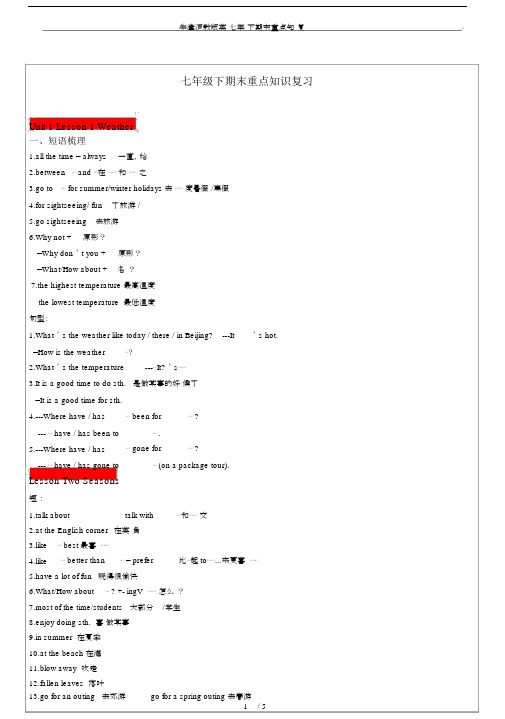
牛津沪教版英七年下期末重点知复七年级下期末重点知识复习Unit 1 Lesson 1 Weather一、短语梳理1.all the time = always一直,始2.between⋯and⋯在⋯⋯ 和⋯⋯ 之3.go to⋯for summer/winter holidays去⋯⋯ 度暑假/寒假4.for sightseeing/ fun了旅游/5.go sightseeing去旅游6.Why not +原形?=Why don ’ t you +原形?=What/How about +名?7.the highest temperature 最高温度the lowest temperature 最低温度句型:1.What ’ s the weather like today / there / in Beijing? ---It’ s hot.=How is the weather⋯?2.What ’ s the temperature---⋯It? ’ s⋯⋯3.It is a good time to do sth. 是做某事的好候了=It is a good time for sth.4.---Where have / has⋯ been for⋯ ?--- ⋯ have / has been to⋯ .5.---Where have / has⋯ gone for⋯ ?--- ⋯ have / has gone to⋯ (on a package tour).Lesson Two Seasons短:1.talk about talk with⋯和⋯⋯交2.at the English corner在英角3.like⋯ best最喜⋯⋯4.like⋯ better than⋯ = prefer比⋯起to⋯⋯...来更喜⋯⋯5.have a lot of fun玩得很愉快6.What/How about⋯ ? +- ingV⋯⋯怎么?7.most of the time/students大部分 /学生8.enjoy doing sth. 喜做某事9.in summer 在夏季10.at the beach 在海11.blow away 吹走12.fallen leaves 落叶14.make snowmen 堆雪人牛津沪教版英七年下期末重点知复法:so 和 neither 引的倒装句1、 So 同,也一So 后面接 be,have, has, do, does, did 或情,然后接主,其的与上文一致,人称与主一致。
七年级英语下册 知识点总结 牛津上海版

七年级英语下册知识点总结牛津上海版Module 1 Garden City and its neighbours1. How are you getting on with your travel guide?get on with ―发展‖; ―与……相处(融洽)‖I’m getting on well with the preparation.How are you getting on with your new classmates?2. be famous for… (以/由于…… 出名)be (well) known as…(以/ 作为… .被人知晓)Shanghai is famous for its night views.Shanghai is also known as a ―Shopping Paradise‖ because there are a lot ofdepartment stores and huge shopping centres.上海被誉为―购物天堂‖,因为上海有不少百货商店和大型购物中心。
Qingpu is famous for its fish and rice.3. It is + adj. + that (主语从句), 表示― ……太…… 了‖It is wonderful that we can have dinner on the 91st floor in Shanghai World Financial Centre.It is not surprising that many tourists come to visit Shanghai every year toshop.It is + adj. + to do s.th.It is convenient to travel between Pudong and Puxi.=To travel between Pudong and Puxi is convenient.It is terrible to have dinner in this restaurant. The food tastes awful.=To have dinner in this restaurant is terrible.4. If you go there, you will see a huge open area with green grass, trees, fountains and pigeons. 主句用普通将来(或者can, may, must),从句用普通现在时。
牛津英语七年级下册期末复习知识点
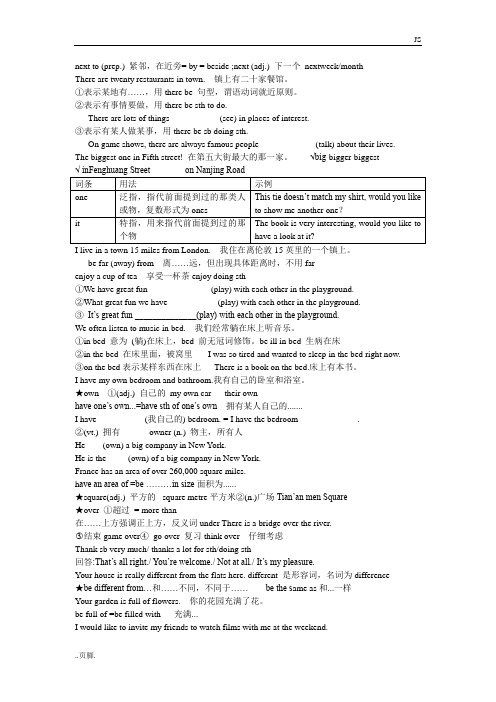
next to (prep.) 紧邻,在近旁= by = beside ;next (adj.) 下一个nextweek/monthThere are twenty restaurants in town. 镇上有二十家餐馆。
①表示某地有……,用there be 句型,谓语动词就近原则。
②表示有事情要做,用there be sth to do.There are lots of things ___________(see) in places of interest.③表示有某人做某事,用there be sb doing sth.On game shows, there are always famous people_____________(talk) about their lives. The biggest one in Fifth street! 在第五大街最大的那一家。
√big-bigger-biggestbe far (away) from 离……远,但出现具体距离时,不用farenjoy a cup of tea 享受一杯茶enjoy doing sth①We have great fun ______________(play) with each other in the playground.②What great fun we have ___________(play) with each other in the playground.③It’s great fun ______________(play) with each other in the playground.We often listen to music in bed. 我们经常躺在床上听音乐。
①in bed 意为(躺)在床上,bed 前无冠词修饰。
be ill in bed 生病在床②in the bed 在床里面,被窝里 I was so tired and wanted to sleep in the bed right now.③on the bed表示某样东西在床上There is a book on the bed.床上有本书。
牛津沪教版英语七年级下期末重点知识复习总结
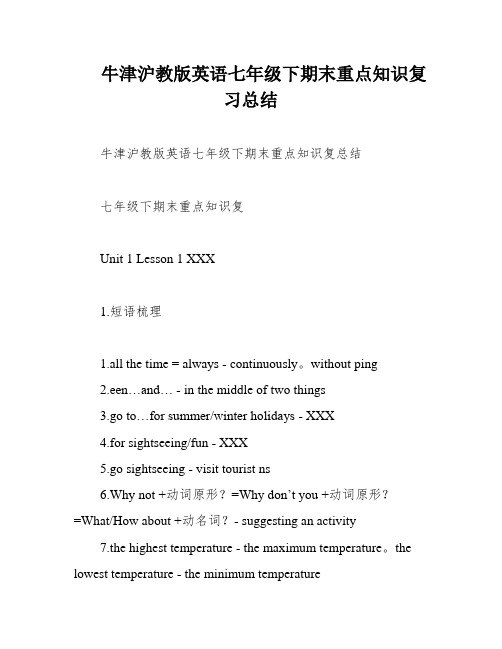
牛津沪教版英语七年级下期末重点知识复习总结牛津沪教版英语七年级下期末重点知识复总结七年级下期末重点知识复Unit 1 Lesson 1 XXX1.短语梳理1.all the time = always - continuously。
without ping2.een…and… - in the middle of two things3.go to…for summer/winter holidays - XXX4.for sightseeing/fun - XXX5.go sightseeing - visit tourist ns6.Why not +动词原形?=Why don’t you +动词原形?=What/How about +动名词?- suggesting an activity7.the highest temperature - the maximum temperature。
the lowest temperature - the minimum temperature句型:1.What’s the weather like today/the re/in Beijing。
---It’s hot。
= How is the weather…。
- asking about the weather2.What’s the temperature…。
---It’s…… - asking about the temperature3.It is a good time to do sth。
= It is a good time for sth。
- indicating a good time to do something4.---Where have/has…been for…。
---…have/has been to…- asking XXX5.---Where have/has…gone for…。
Unit9单元复习讲义-牛津上海版七年级英语下册
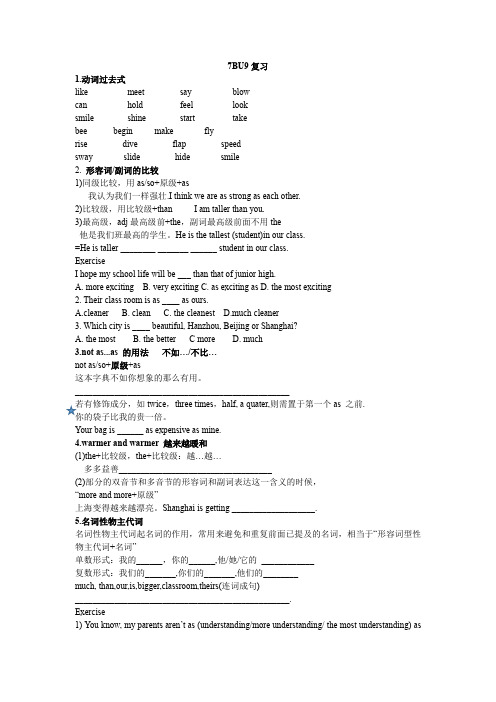
7BU9复习1.动词过去式like meet say blowcan hold feel looksmile shine start takebee begin make flyrise dive flap speedsway slide hide smile2. 形容词/副词的比较1)同级比较,用as/so+原级+as我认为我们一样强壮.I think we are as strong as each other.2)比较级,用比较级+than I am taller than you.3)最高级,adj最高级前+the,副词最高级前面不用the他是我们班最高的学生。
He is the tallest (student)in our class.=He is taller ________ _______ ______ student in our class.ExerciseI hope my school life will be ___ than that of junior high.A. more excitingB. very excitingC. as exciting asD. the most exciting2. Their class room is as ____ as ours.A.cleanerB. cleanC. the cleanestD.much cleaner3. Which city is ____ beautiful, Hanzhou, Beijing or Shanghai?A. the mostB. the better C more D. much3.not as...as 的用法不如…/不比…not as/so+原级+as这本字典不如你想象的那么有用。
_________________________________________________twice,three times,half, a quater,则需置于第一个as 之前.Your bag is ______ as expensive as mine.4.warmer and warmer 越来越暖和(1)the+比较级,the+比较级:越…越…多多益善___________________________________(2)部分的双音节和多音节的形容词和副词表达这一含义的时候,“more and more+原级”上海变得越来越漂亮。
- 1、下载文档前请自行甄别文档内容的完整性,平台不提供额外的编辑、内容补充、找答案等附加服务。
- 2、"仅部分预览"的文档,不可在线预览部分如存在完整性等问题,可反馈申请退款(可完整预览的文档不适用该条件!)。
- 3、如文档侵犯您的权益,请联系客服反馈,我们会尽快为您处理(人工客服工作时间:9:00-18:30)。
Unit 1 一、短语1. plan to do 计划做某事2. go skiing 去滑雪3. these days 如今4. be famous for 因…而著名5. be famous as 作为…而出名6. be similar to 与…相似7. look down on…俯视,鸟瞰8. take part in 参加9. with a difference 与众不同的10. all / different kinds of 各种各样的11. a warm welcome 热烈欢迎12. at first 起初13. give a talk 演讲14. according to 根据,按照15. on one’s way (to) 在…的路上16. interesting places 名胜17. on time18. far away from…远离……19. get through 穿过20. next to 在…旁边21. in fact 事实上22. keep out invaders 阻止侵略者23. sail away 驶走;漂走24. millions of 很多,上百万的25. hope to do 希望做某事26. one day 有一天27. in the future 在未来28. tell sb. about sth. 告诉某人某事29. have a wonderful time 过得愉快30. enjoy oneself 31. go abroad 出国31. go abroad 出国32. fruit and vegetables 蔬果33. go sightseeing 观光34. go /be on holiday 渡假35. from place to place 到处36. call sb. on the phone 打电话给某人37. by the way 顺便说说38. the top of………的顶端39. sail down the river 顺流而下40. order food 点菜准时41. fall over 倒塌42. lean to 向……倾斜43. be closed to the public 不对公众开放二、词形转换care (v. / n.) - careful (adj.) - careless (adj.) - carefully (adv.)cross (v.) - across (prep.) crowd (v.) - crowded (adj.)center (n.) - central (adj.) France (n.) - French (n. / adj.)taste (v. / n.) - tasty (adj.) wonder (n.) - wonderful (adj.)design (v.) - designer (n.) different (adj.) - difference (n.)scenery (n.) - scenic (adj.) interest (v.) - interesting (adj.)meet (v.) - meeting (n.) amuse (v.) - amusing (adj.) - amusement (n.)三、语法1. what do you mean by (doing)…?2. and, but, so3.bring / show sb. sth. = bring / show sth.4. arrive & reach & get to5. voice & noise & sound6. so that 6. find 的用法7. spend & take …8. watch / see / hear sb. …do / doing9. (many) thanks for (doing) sth. 10. the number of & a number of11. with 表带有…12. 表达建议:why not…? / why don’t you…?/ what / how about doing…? / would13. such as & for example14. used to do & be used to doing15. until 5. one of + 复数名词+ 动词(单数)16. cross & across & through17. though & but18. it’s believed / shown (that)…19. work hard & hard work20. 动名词作主语& It’s + adj. + to doUnit 2一.短语1. protect the environment 保护环境提供某物给某人2. give out harmful gases 排放有害气体3. on Earth=on the earth 在地球上4. on earth 究竟5. come/be from 来自于6. one another/each other 互相;彼此7. collect some facts 收集信息8. living things 生物9. for example / such as 例如(上)10. be useful for…对……有用11. warn sb. (not)to do sth.告诫某人(不)做某事12. know a lot about 对……知道很多13. be in danger 处于危险之中14. be in trouble 处于困境之中;遇到麻烦15. be interested in …对……感兴趣16. communicate with sb. 与某人进行交流17. do the job (of)…起……作用18. pass sth to sb = pass sb sth 传递某物给19. cut down 砍掉;砍伐20. not…at all 根本不……21. a little 一点22. write an article 写文章23. be worried about…对……担心24. care about 关心;在乎25. make noise 吵闹;制造噪音26. give sb a hand= help sb 帮助某人27. feel about …对……有某种看法28. provide sth for sb= provide sb with sth= supply sb with sth =supply sth for/to sb)29. in the past 在过去30. the answer to the question 问题的答案31. do/try one’s best to do sth 尽力做某事32. start out small 从小事做起33. throw rubbish 扔垃圾34. thrwo …into/ onto…把……扔到……里35. both sides of………的双面36. belong to 属于37. make our environmen38. in the beginning 起初;刚开始的时候39. get /feel tired 感到疲惫40. stop…from doing sth. 阻止……做某事41. in one’s opinion 在某人看来42. in order of…以……的次序43. bring about 导致;引起某人44. blow away 吹走45. be caught in (a sandstorm) 遇上(沙尘暴)46. take measures 采取措施47. be washed away 被冲走48. make a difference 造成差别49. take care of 照顾50. run out of 用完51. even if 即使;纵然52. realize the importance of 认识到……的重要性二.词形转换use (v./n.) -useful (adj.) - useless (adj.)harm (v./n.) - harmful (adj.) - harmless (adj.) wonder (v./n.) - wonderful (adj.) noise (n.) - noisy (adj.) rain (v./n.) - rainy (adj.)health (n.) - healthy (adj.) condition (n.) - conditioner (n.) contain (v.) - container (n.) fight (v.) - fighter (n.)pollute (v.) - pollution (n.) communicate (v.) - communication (n.) worry (v. ) - worried (adj.) nature (n.) - natural (adj.)danger (n.) - dangerous (adj.) science (n.) - scientist (n.)choose (v.) - choice (n.) appear (v.) - disappear (v.)tire (v.) - tired (adj.) - tiring (adj.) important (adj.) - importance (n.)environ (v.) - environment (n.) chemistry (n.) - chemical (adj.)produce (v.) - product (n.)三.语法1. few, a few, little, a little 9. for example & such as2. join & take part in 10.without 的用法3. talk, say, speak, tell 11. warn 的用法4. voice, sound, noise 12. seem 的用法5. living & alive 13. make sb. do & make sb. / sth. + adj6. stop to do & stop (from) doing 14. or 在否定句中表并列7. -ed & -ing 15. 的用法现在进行时与一般现在时8. on over above 的区别16. 基本的反意疑问句Unit 3一、短语belong to属于because of因为reception desk接待处look for a job go 找一份工作book a room订一个房间go forward向前走allow sb. to do sth. 允许某人做某事on the left / right…在…左/右边lead sb. to …把某人带到…in the left-hand corner在左手(边)角落fire exit 消防通道next to在…的隔壁safety first安全第一welcome to欢迎来到…describe sth. to sb. 向某人描述…be able/unable to do不)能做某事bark loudly(狗)大声吠叫get the chance to do有机会做某事wake up睡醒hurt oneself弄伤自己smell smoke闻到烟味enjoy oneself过得愉快fire alarm火警be proud of…以…为荣wet some towels湿了些毛巾teach oneself =learn by oneself自学lie on the floor躺在地板上as fast as possible尽快seem like似乎像…help oneself to…随便吃些…fire engine消防车hear about 听说music to one’s ears悦耳的声音go past 经过show up 出现call for help 喊救命seconds later 一会儿、几秒后be on fire 起火,着火against the rule(s) 违反规定put out fire 灭火a sense of smell / sight嗅觉/视觉shout at 朝…大喊/ hearing / taste / touch听觉/味觉/触觉be close to 接近…keep one’s balance保持平衡look out of…朝…外面fall down跌倒be full of充满have a cold 感冒be seriously hurt伤得很严重construction worker建筑工人decide to do 决定做某事use…for doing / to do用…来做某事climb up the ladder 爬上梯communicate with sb. 与…沟通again and again 一次又一次地in fact事实上two more/another two 再多两个quite a few许多,相当多complain to…向…投诉/抱怨perfume maker香水制造商as well(句末)也be useful for对…有用all day整天二、词形转换receive (v.) - reception (n.) listen (n.) - listening (n.)explanation (n.) - explain (v.) build (v.) - building (n.)construct (v.) - construction (n.) most (adj.) - mostly (adv.)manage (v.) - manager (n.) loud (adj.) - loudly (adv.)safe (adj.) - save (v.) - safety (n.) serious (adj.) - seriously (adv.)sleep (v.) - asleep (adj.) able - unable (opp.)die (v.) - dead (adj.) ability - disability (opp.)use (v.) - useful (adj.) friendly - unfriendly (opp.)see (v.) - sight (n.) with - without (opp.)difference (n.) –different (adj.) fireman - firemen (复数)hear (v.) - hearing (n.)三、知识要点1. few, (quite) a few, little, (quite) a little 等2. both 的用法3. welcome 的用法4. 不规则动词的过去式(lead, leave, wet, smell, put, lie 等)5. seem 的用法6. stop to do & stop doing7. because & because of8. 人称代词& 反身代词9. taste / smell 等的用法10. two more & another two…11. the + adj. 表…一类人12. thank you for / use for doingUnit 4一.短语a packet of 一盒 a pot of 一壶in a way 在某种程度上shake one’s head 摇头change…into…=turn…into…把…..变成……be connected to 与……相连接look foolish 看起来很愚蠢in packets 用包装的形式flow through…通过……流动use sth to do sth 用……做……all kinds of 各种各样make electricity 制电a power station 发电厂figure out 弄清;算出for example 例如pay special attention to (doing) sth 特别注意electrical appliance/machine 电器deal with sth 处理某事glass/plastic container 玻璃/塑料容器in our daily life 在我们日常生活中pick sb. up 搭载人,带人走seem to do 看起来像做make our lives easier 使我们的生活更舒适 a series of 一系列;一套help sb (to) do sth=help sb with sth 帮助某人做某事in numbers 用数字difference between A and B A 和B 的不同之处make sth/sb adj 使某人/某物怎样make sb do sth 使某人做某事keep a diary 写日记leave…on 使…..处于工作/使用的状态by doing sth 以……方式free…from (doing) sth 使…..从……中解脱出来look through 通过……看;翻阅be careful of/with sth 对……小心put…away 将…收起;把…放回原处keep sth dry 保持某物干燥(keep sth/sb adj) answer the telephone 接电话a piece of advice(不可数) 一条建议lean out of 从……探出身turn on/ switch on 打开dress properly 着装得体turn off/ switch off 关掉around 11a.m. 早上11 点左右go out 熄灭urn up/ turn down (音量)调大声/小声(be) on the safe side 为了安全起见;以防万一more and more crowded 越来越拥挤make sure (that)确保on one way or another 以这样或那样的方式generally speaking 一般而言shopping mall 大型购物中心keep silent/ quiet 保持安静play the guitar 弹吉他play chess下棋at first 起初start a fire 引起火灾二.词形变化fool (v. 欺骗;n. 傻瓜) -foolish (adj )careful(adj.)---carefully(adv.)---care(v.) safe (adj.)—safely(adv.)explain (v.) –explanation (n.), servant (n.) ---serve (v.),contain (v.)---container(n.), produce(v.)---product(n.),different (adj.)--- difference (n.) battery---batteries,housewife---housewives, move(v.)---movement(n.)patient-impatient, unplug---plug,三.句型/语法1. Not a bad explanation.不错的解释7. 动名词的用法2. Can you get me …?你能给我买/拿……8. 情态动词:can, may, must3. It is hard to imagine…..很难想象……9. 分数的表达:基数+序数(one tenth 十4. like 的用法v.& prep. 分之一;two tenths 十分之二)5. with 的用法6. how soon, how long, how often, how farUnit 5一、短语find…interesting 觉得/发现……有趣find it adj to do sth 觉得/发现做某事怎样in our lives 在我们的生活中be interested in 对……感兴趣be on 上演;播放miles and miles 好几英里go to sleep = fall asleep 入睡;睡着go to bed 就寝all right 确实;好的be similar to…与……相似be different from 与……不同keep lively 保持活力(keep+adj)keep doing sth 一直/不停做某事hate doing sth 讨厌做某事hate being bored 讨厌烦闷take care of = look after 照顾live on…以……为生describe sth/sb as…把某物/某人描述成.keep…as pets 养……作宠物break the rules 破例;犯规run in rings 绕圈跑make sure 确保knock on/at the door 敲门get lost 迷路fall down 掉下来on one’s own=by oneself 独自;靠自己stone deaf 完全聋的的力量mind doing sth 介意做某事be pleased with…对……满意;喜欢at work 在工作46. be puzzled by…对……感到迷惑a dull moment 寂寞的一刻pay attention to (doing) sth 注意某事/做ten miles away 十英里远某事in a mess 肮脏;一团糟shout at sb.对某人大喊大叫pick out 挑出;辨别出talk with sb 与某人交谈blow away 吹走.in a friendly way 以友好的方式many a week=many weeks 数周be full of…充满/装满……an’t wait 迫不及待rush out 冲出去make sth for sb 为某人做某事waste time on (doing) sth 浪费时间在某lots of = a lot of 许多事上/做某事win a prize 赢得奖项 a crowd of 一群win first prize 获得一等奖have/take a shower 冲凉;沐浴go away 走开56. pick up 捡起keep back 别往前走in many ways 在许多方面right now = right away 马上;现在at the end of 在……的尽头二、词性变化、肯定并否定:interesting –uninteresting cheerful - cheerlessgenerous - ungenerous helpful- helplesspatient-impatient mess (n.) –messy (adj.)successful(adj)-success(n.)-succeed(v.) fun(n.)-funny(adj)freeze (v.)-frozen(adj.) poem(n.)-poet(n.)account(v.)-accountant(n.) calculate(v.)-calculator(n.)三、语法1. there will be 句型2. whole & all3. 代词one & it,ones & them4. who, who’s, whose5. find 的用法6. keep/finish/enjoy/practice/mind…+doing7. keep/be/become/get/turn…+adj.8. 名词性物主代词=形容词性物主代词+nUnit 6一、短语brush one’s teeth 刷牙be on 开着pour into 涌入;倒进happen to 发生look around 四处看drop…into…使……落入……里.flow down 流下fall to 下降到clean…up 把……洗干净refer to 提到;查阅pump…into…用泵把……抽到……keep warm (keep + adj)保持温暖in the first place 起初;一开始keep sth/sb adj 保持某物怎样remember not to dosth 记得不要做某事keep doing sth 继续/不断做某事shake one’s head 摇头help sb do sth 帮助某人做某事come out of 从……出来drive…crazy 让……抓狂rise from 从……升起on holiday 休假;度假carry…to…把……带到……tell story about…讲关于……故事water treatment works 水处理厂no problem 没问题sewage plant 污水处理工厂in charge of 负责;管理ground water 地下水ordinary people 普通人fresh water 淡水flow chart 流程图drinking water 饮用水bar chart 柱状图in fact 事实上fill up 装满;填满die of(thirst, hunger) 死于(口渴,饥饿) believe it or not 信不信由你in the end =at last= finally 最终at least 至少according to 根据take a shower 冲澡(淋浴)sound terrible 听起来很恐怖take a bath 洗澡(坐浴)be in a mess 一团糟leave sth doing 使……处于某种状态at the end(of)在…的末尾instead of (doing)代替(做)twice as much (as) 两倍(多) stop doing sth 停止做某事turn into…变成waste time doing sth 浪费时间做某事be made up of…由……什么组成/构成pick up 捡起from the start of…从……的开始二、词形变化:mix(v.) –mixture(n.) drink(v.)- drinkable(adj.)---undrinkablefreeze--- froze---frozen break—broke--- brokensalt(n.)---salty(adj.) thirst(n) –thirsty(adj)shine(v)---shiny (adj) possible(adj)---possibility(n)treat(v.)---treatment final(adj.) --- finally (adv)三、句型/语法1. It is adj for sb to do sth & it is adj of sb to do2. we need water for doing sth3. It says that +从句4. too…to/ so…that/ enough to do 7. 8.5. remember to do & remember doing until 的用法6. if 条件状语从句Unit 7一、短语in different ways 用不同的方式take off 脱掉(衣服等)(飞机)起飞;have a good/great time=enjoy oneself 玩do a survey 做调查得开心/愉快spend…on sth /( in) doing sth 花……在上/做某事come on 快点;赶快have trouble/difficulty (in) doing sth 做某事有困难plan to do sth 计划做某事learn about 了解,知道no wonder(+从句)难怪;怪不得eating habits 饮食习惯feel hungry and tired 感到又饿又累for example;such as 例如stop doing 停止做某事use sth to do sth= use sth for doing sth talk about 谈论用……做某事make sb do sth 使某人做某事be sure to do sth 一定/务必做某事find sth adj to do = find it adj to do sth 发现/觉得做某事怎样have been to 曾经去过某地at dinner 吃饭时have gone to 去了某地sit at the table 坐在桌子旁have been in 呆在某地get sth from…从……拿……a bit /a little + adj 有点怎样 a knife and fork 一副刀叉a bit of +n = a little + n 一点……cut off 切掉;切下thousands of 数千in the middle of 在……中间start /begin with 以……开始many different kinds of 很多不同种类的later in the meal 饭后be dying 就要死了at the beginning of 在……的开始some more 再要一些as soon as 一……就……different types/kinds of 不同种类的be saved 获救process sth into 把……加工成……according to 根据be good for 对……有益the majority of …大多数的…(not) far from 离……(不)远in recent years 近几年(与现在完成时连用) the same as 和……一样用)tea with sugar 加了糖的茶before/after + doing 做……前/后way of doing sth = way to do sth 做…的方式one more+n = another + n(单数)再(要)一个二词形变化serve(v.)-service(n.) host(n)-hostess(n.女) waiter(n.)-waitress(n.女)save(v)-safe (adj)-safety(n.) smell(n.)-smelly(adj.)(类似的有:tasty, shiny, salty, thirsty,etc) die (v.) - dying (adj.) servant (n.) -- serve (v.)true (adj.) -- truly (adv.) sleep (v.) –asleep (adj.)knife-knives三、句型/语法1. How do you feel about…= What do you think of …你觉得……怎样2. If, as soon as 时间状语从句,“主将从现”原则3. It’s adj of sb. 某人怎样4. 完成时的时间状语:already, yet, just, before, ever, never, since, for5. What’s the matter/touble (with you)? = What’s wrong with you? 你怎么了6. 用how long 提问for/since 的时间状语7. It’s time for sth ……的时间了It’s time to do sth 该做……了8. have been to, have gone to, have been in 的区别9. since 的用法。
